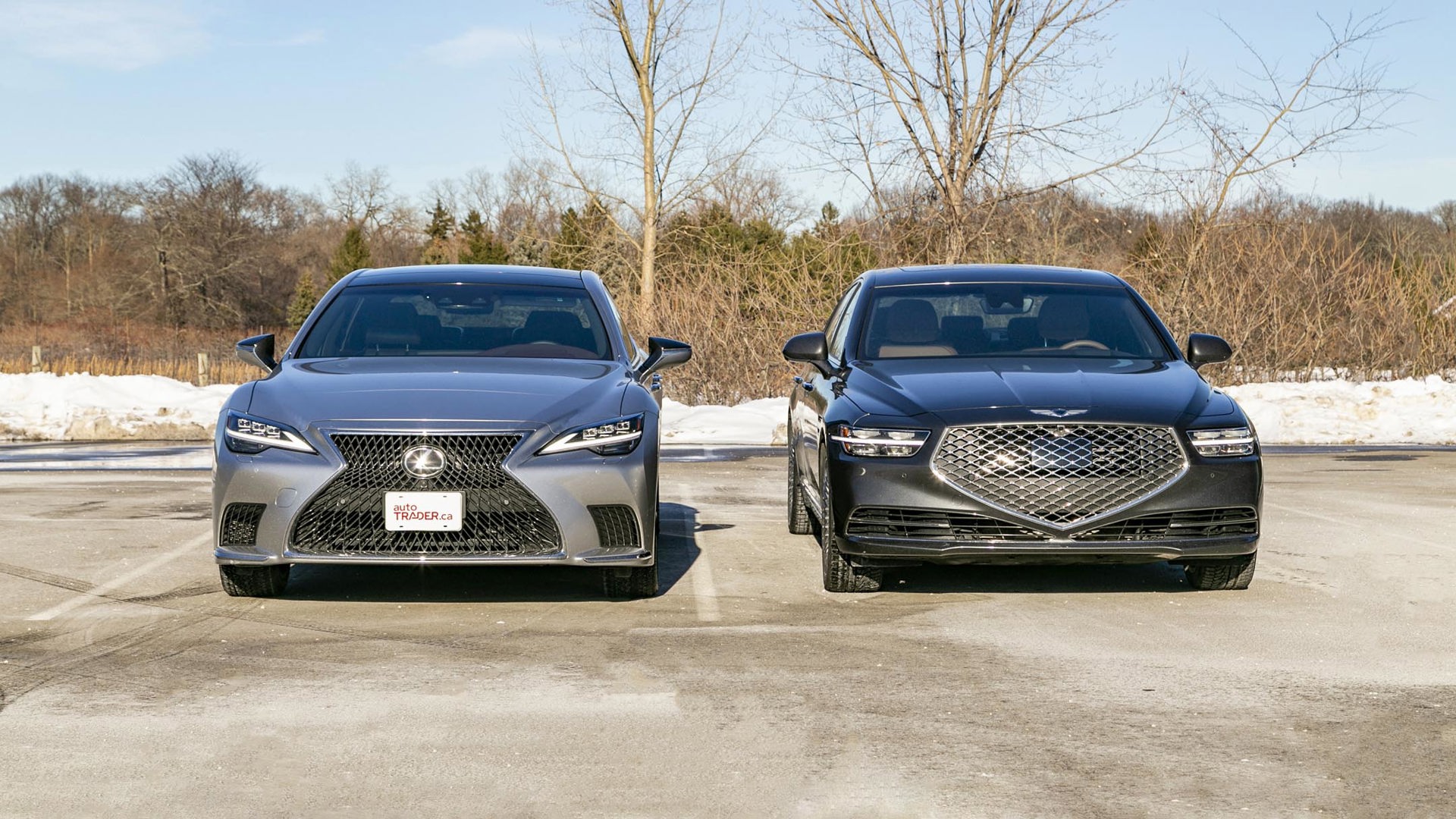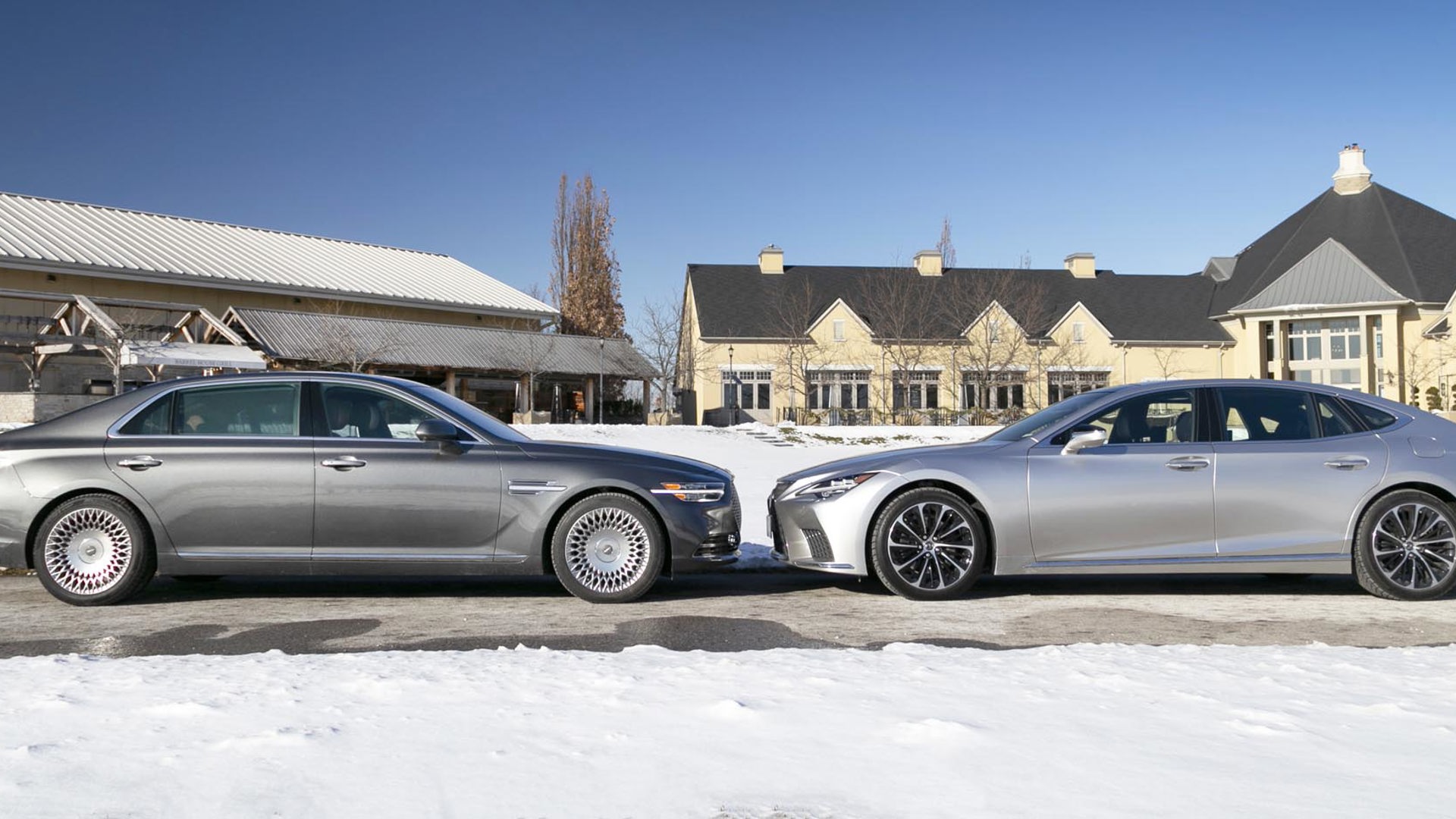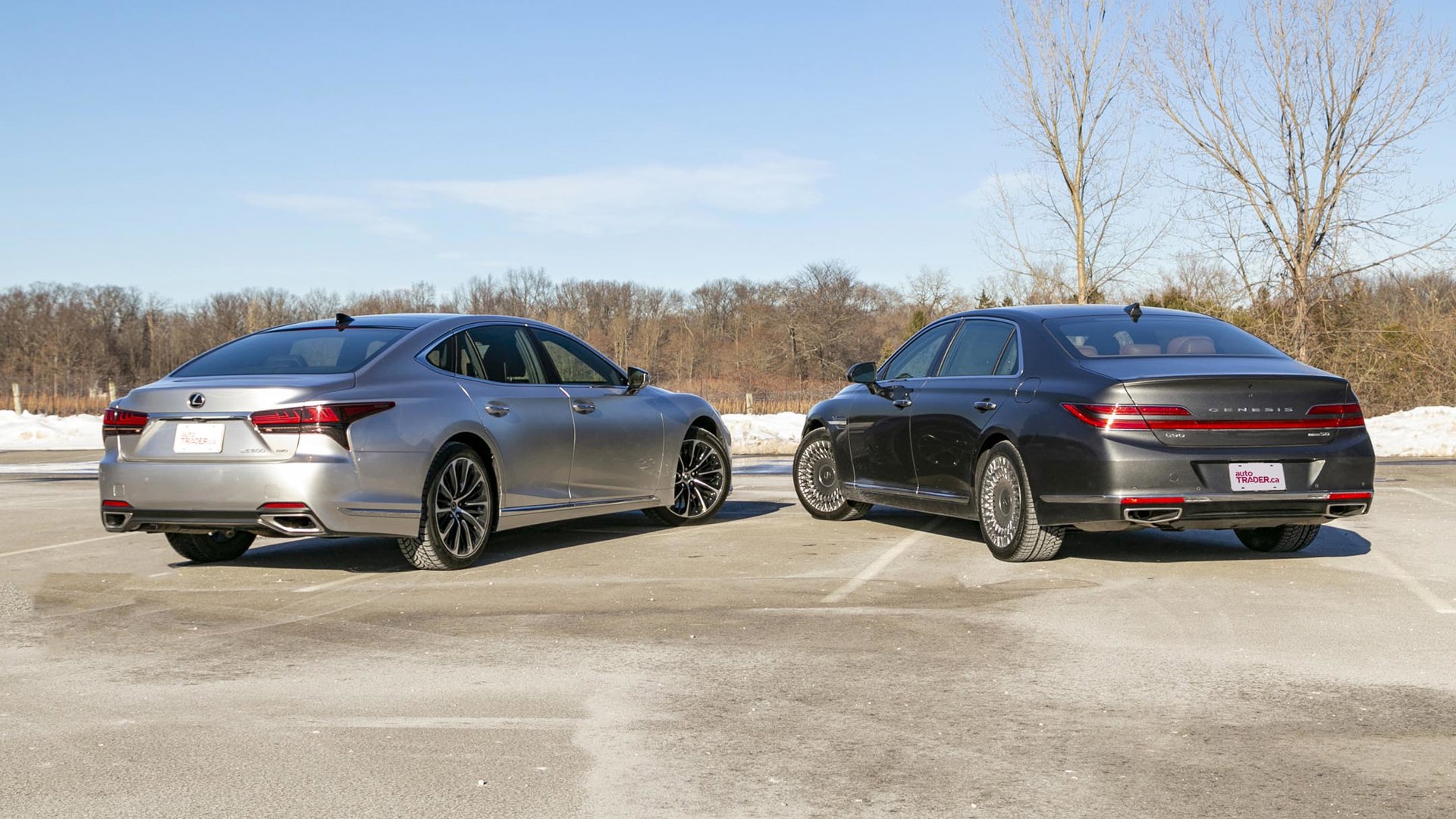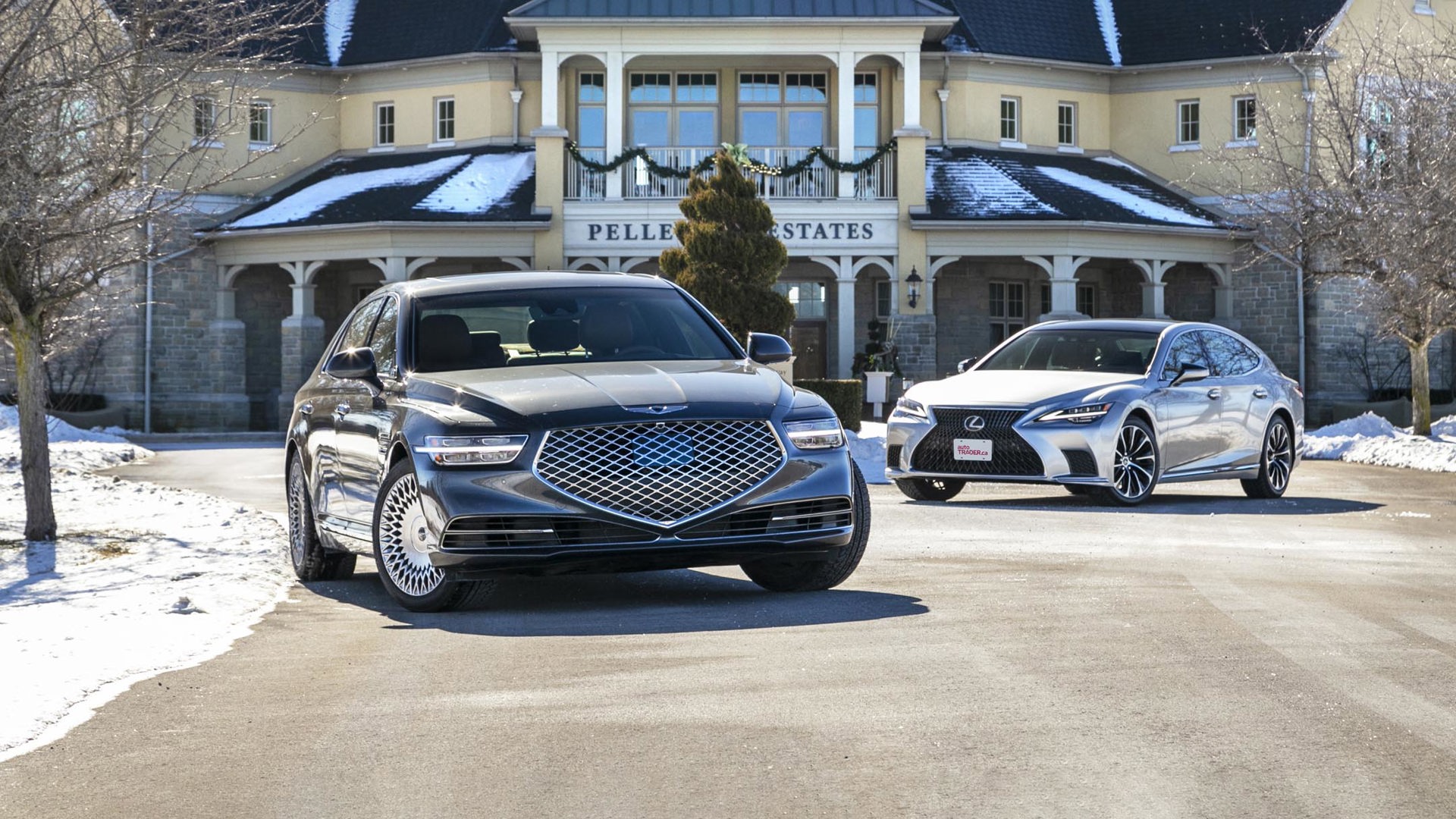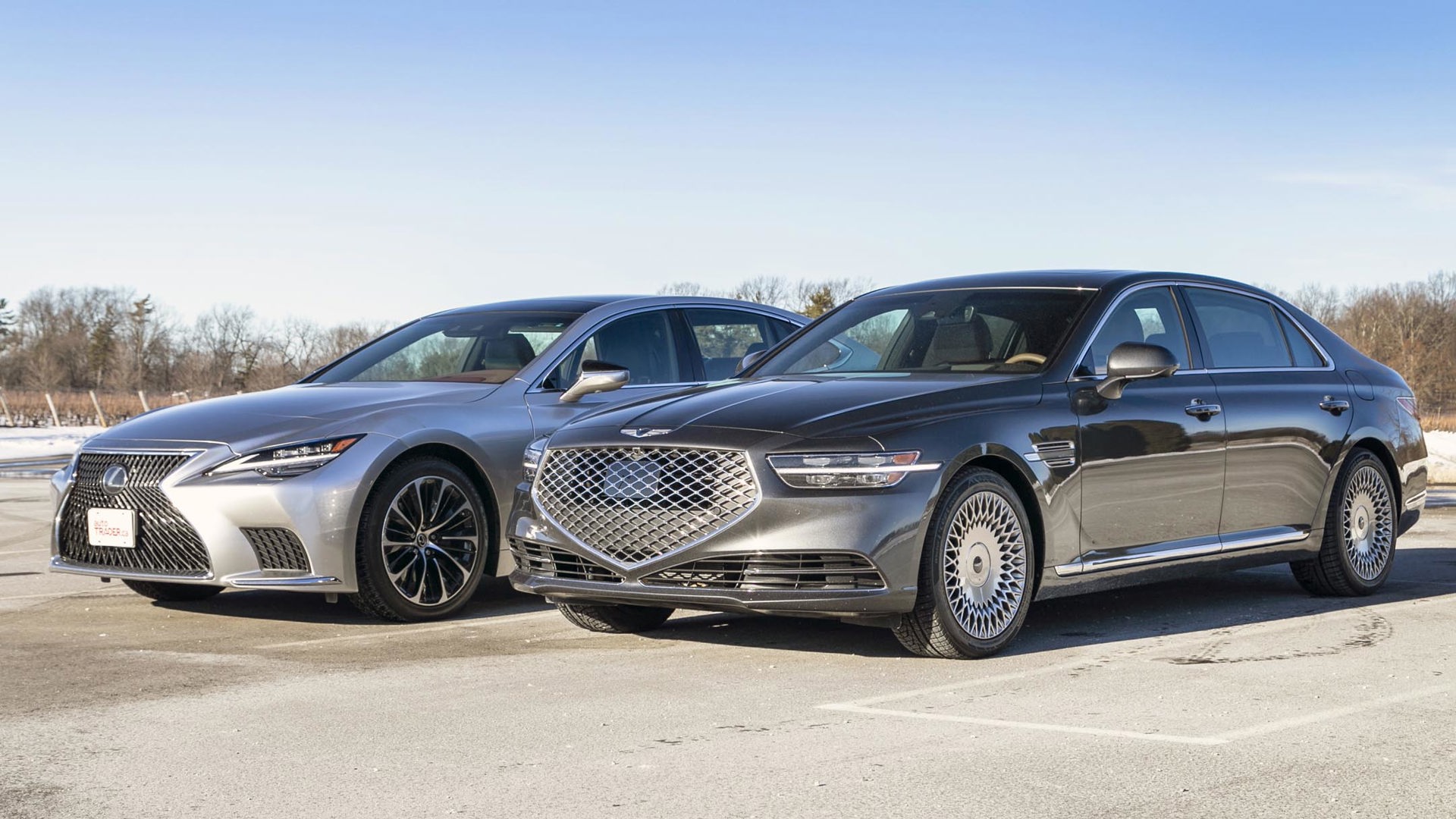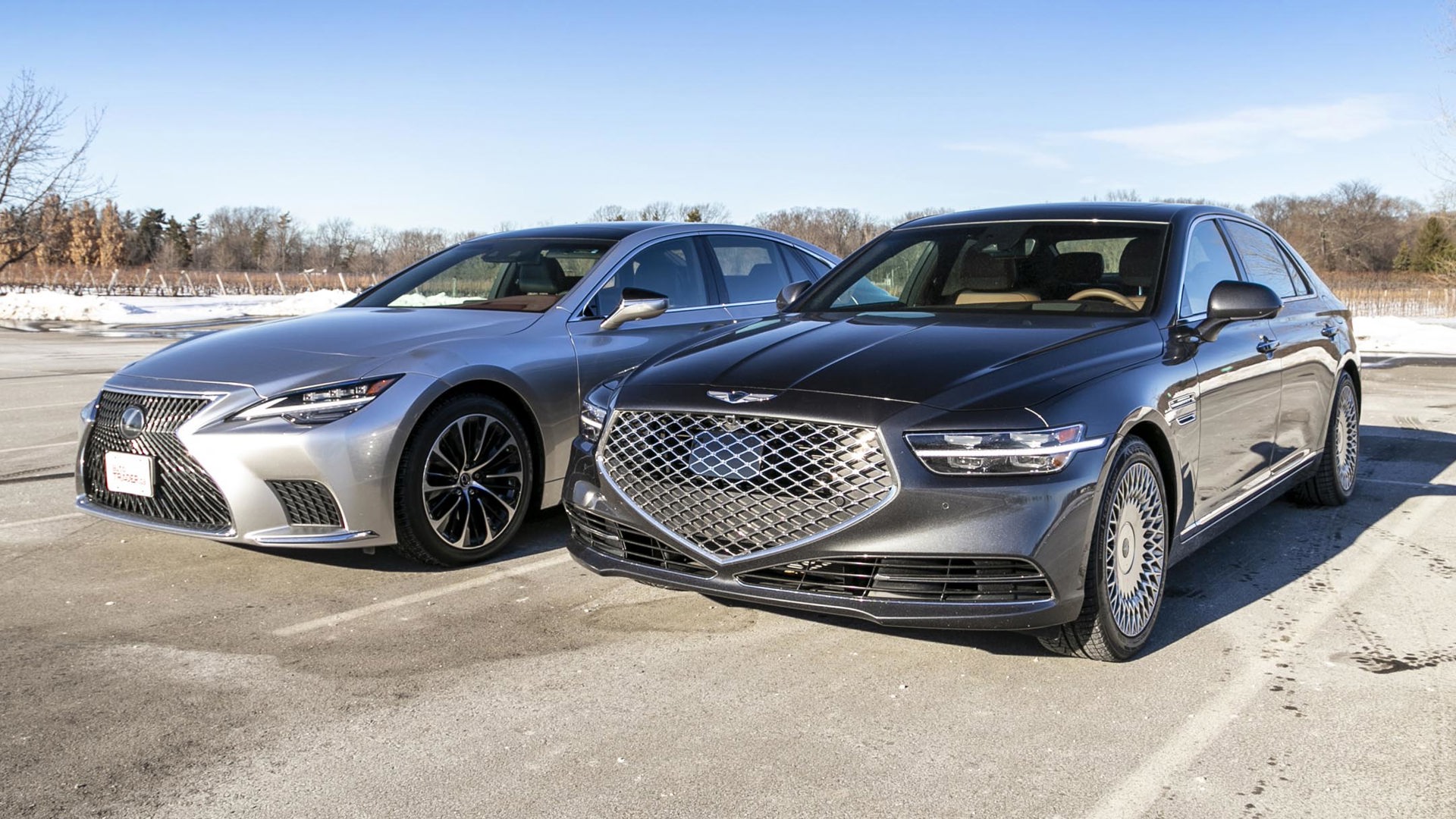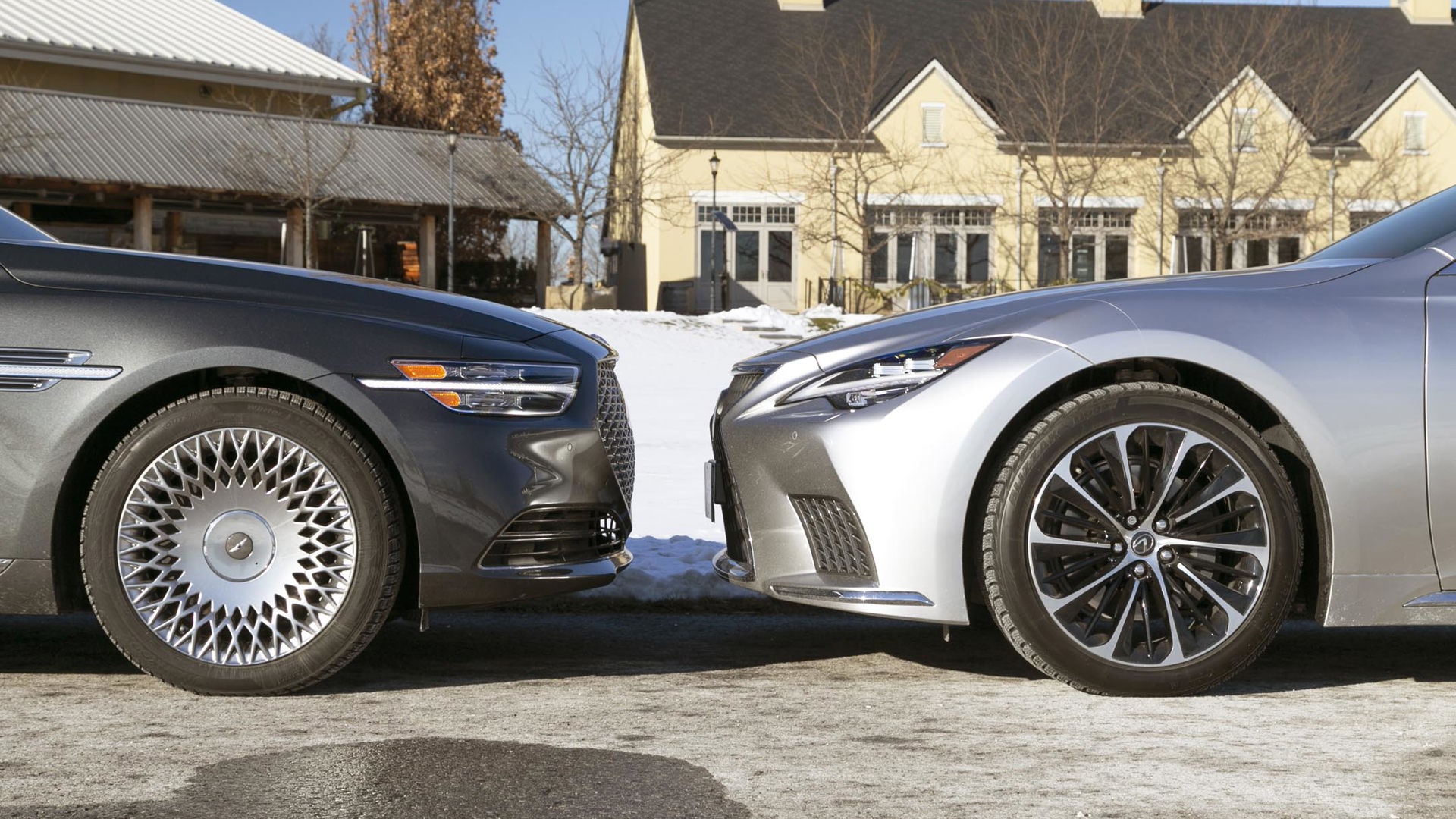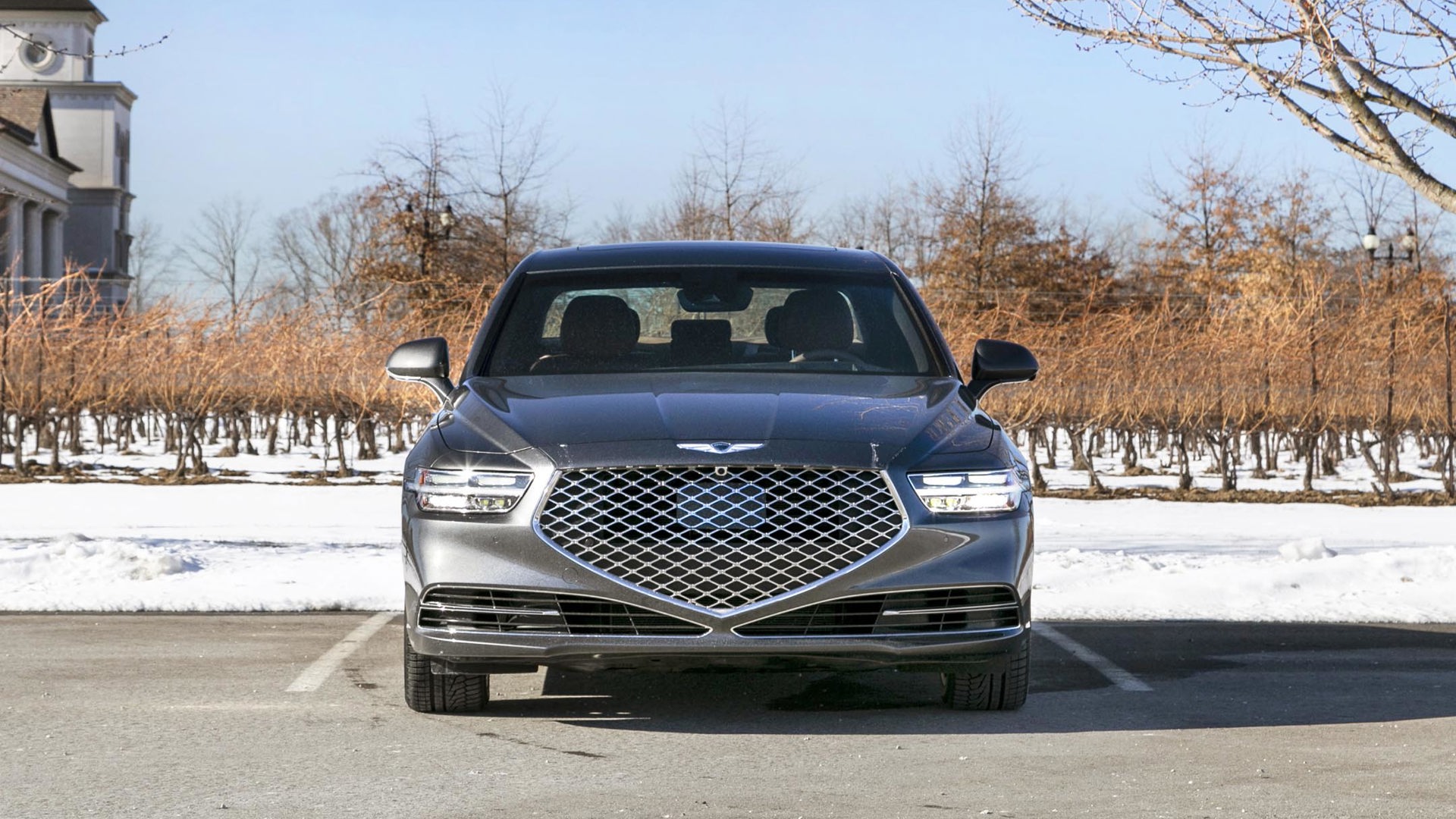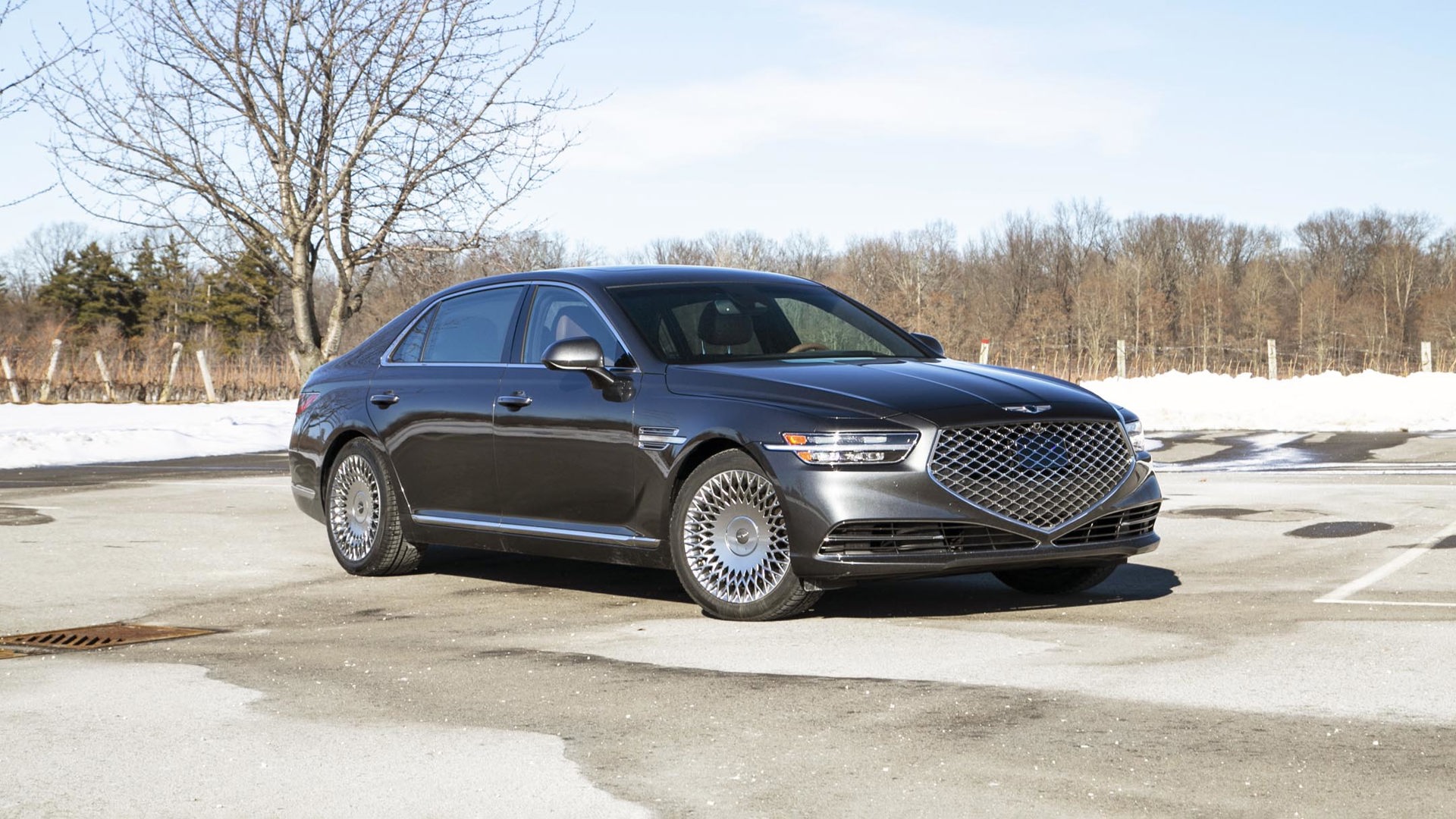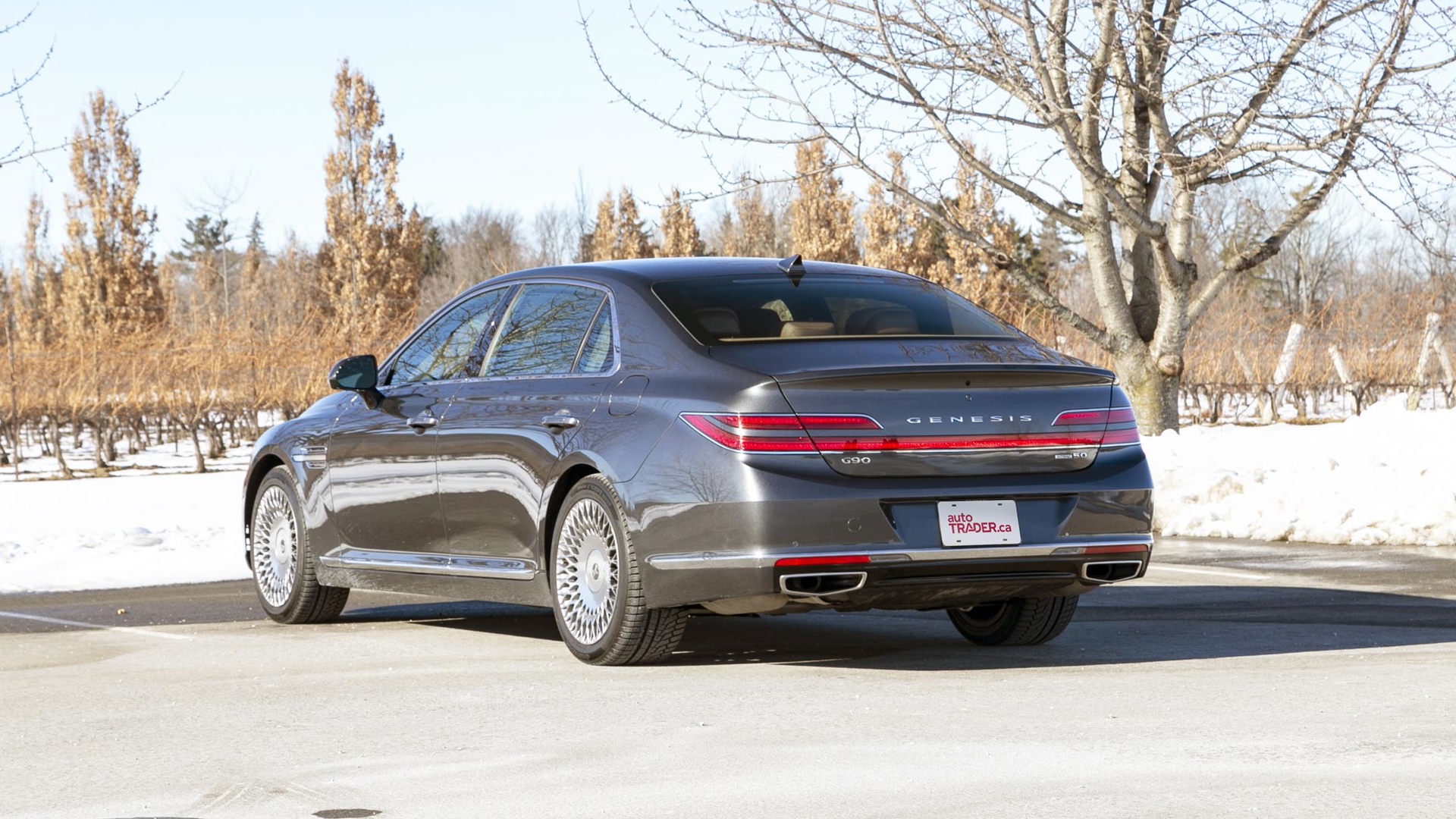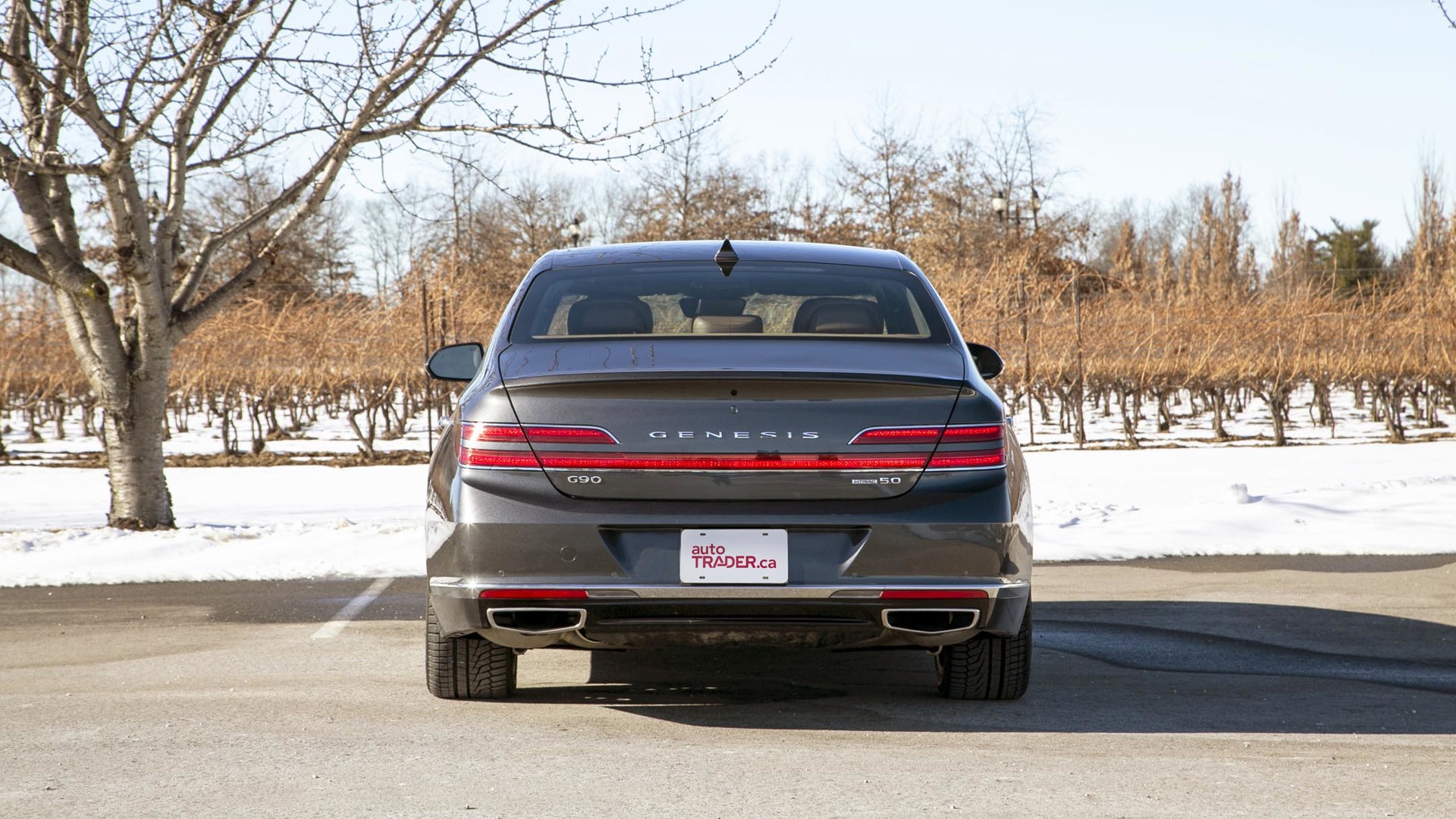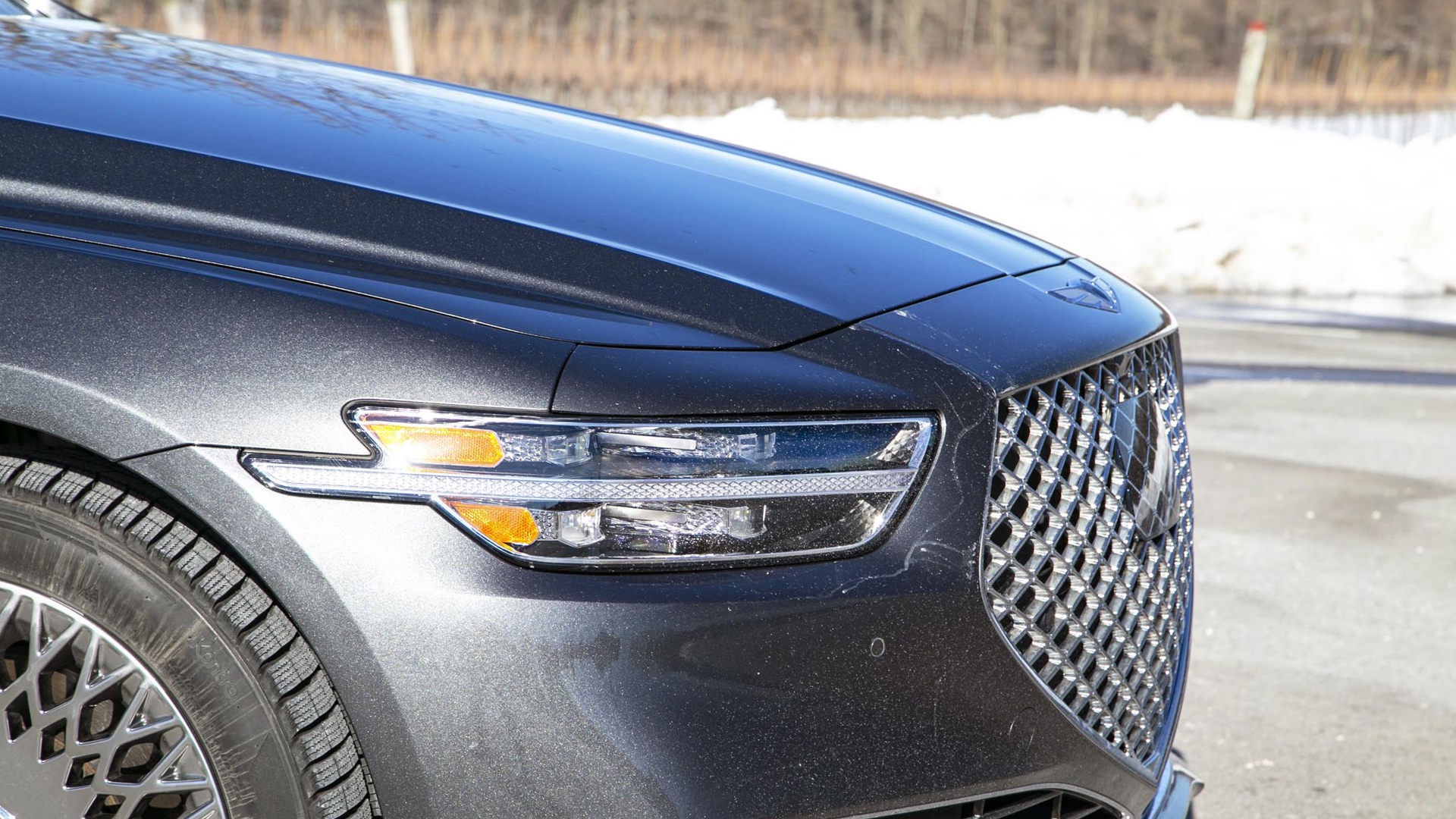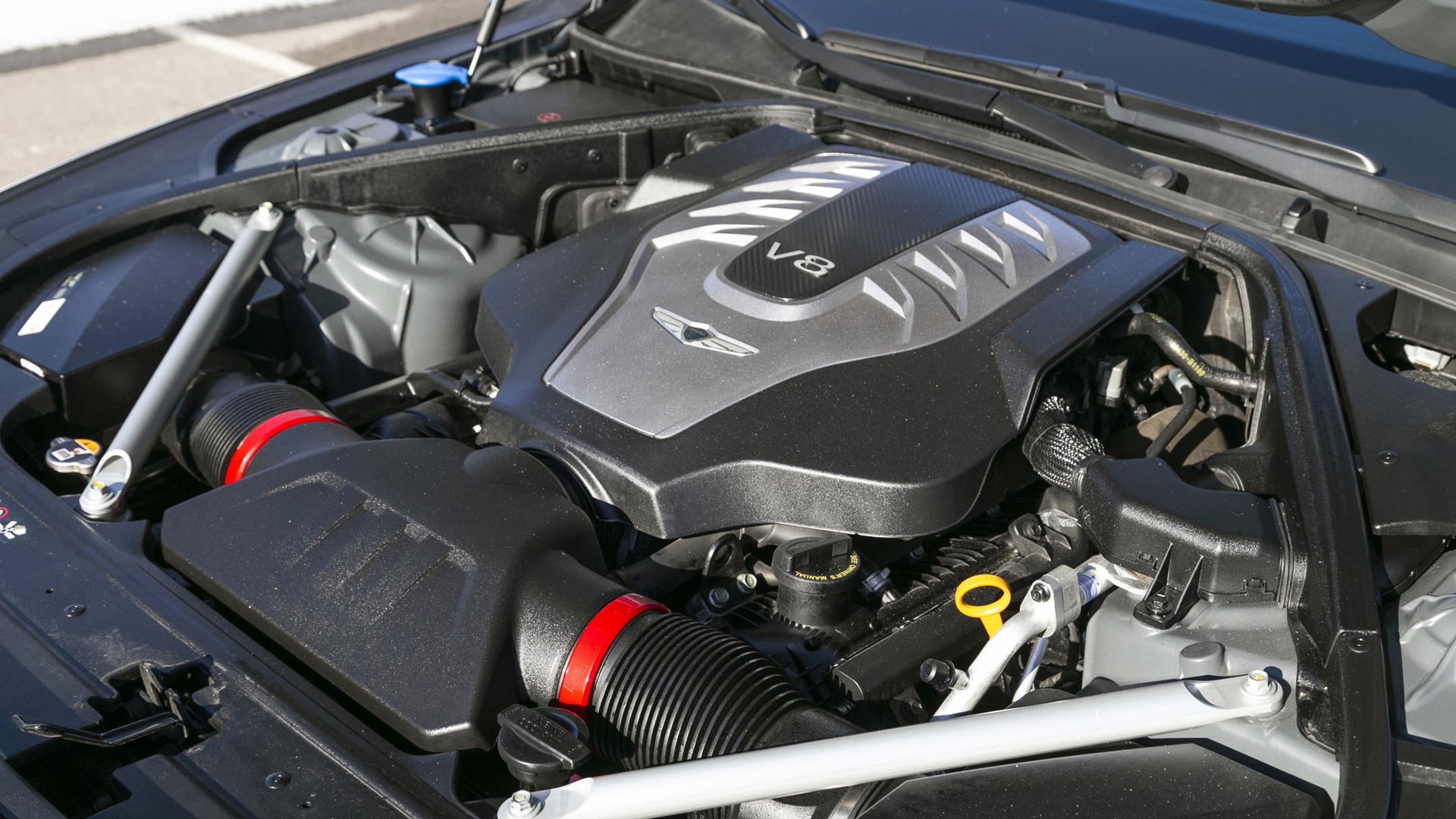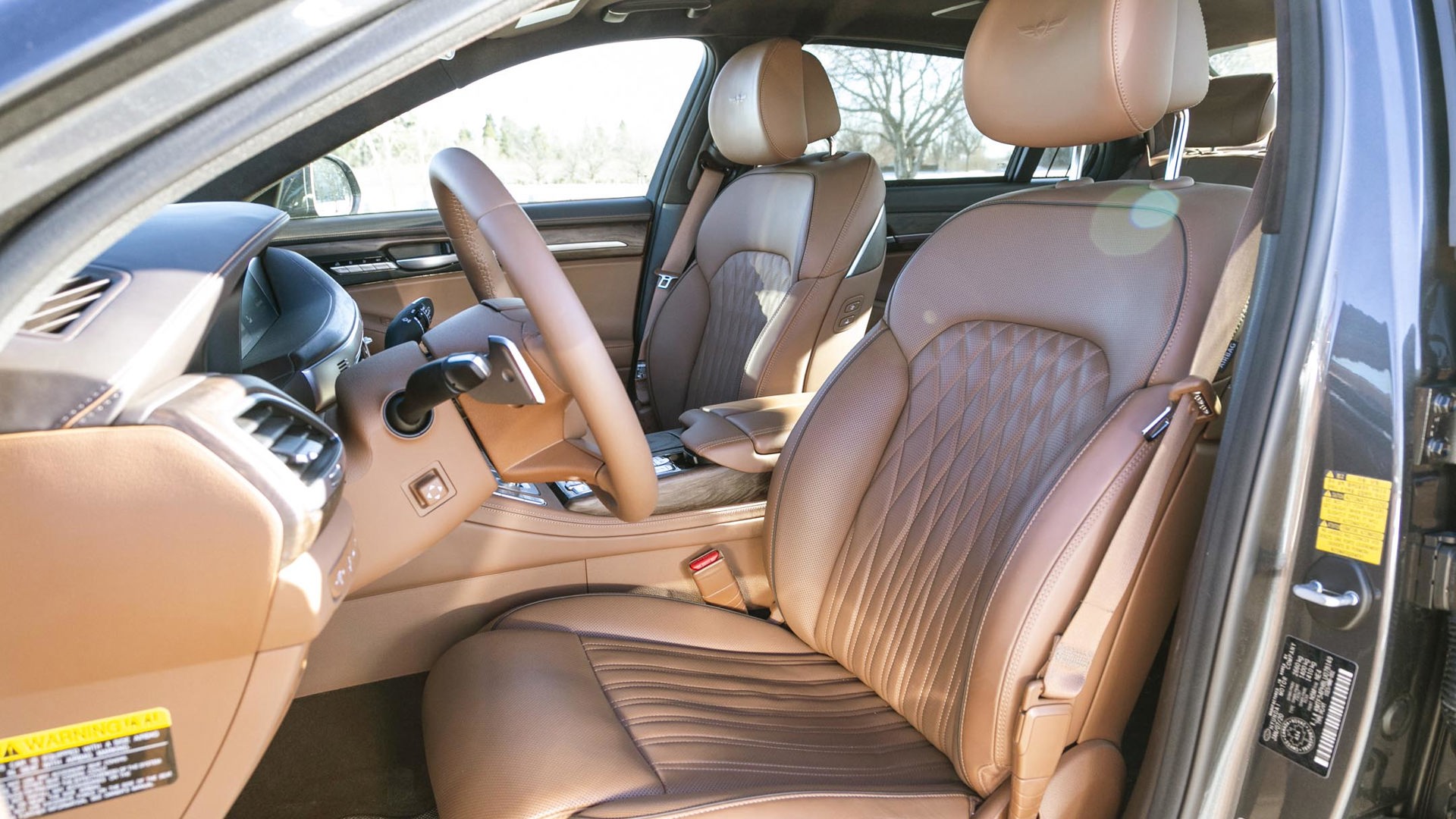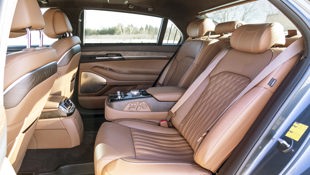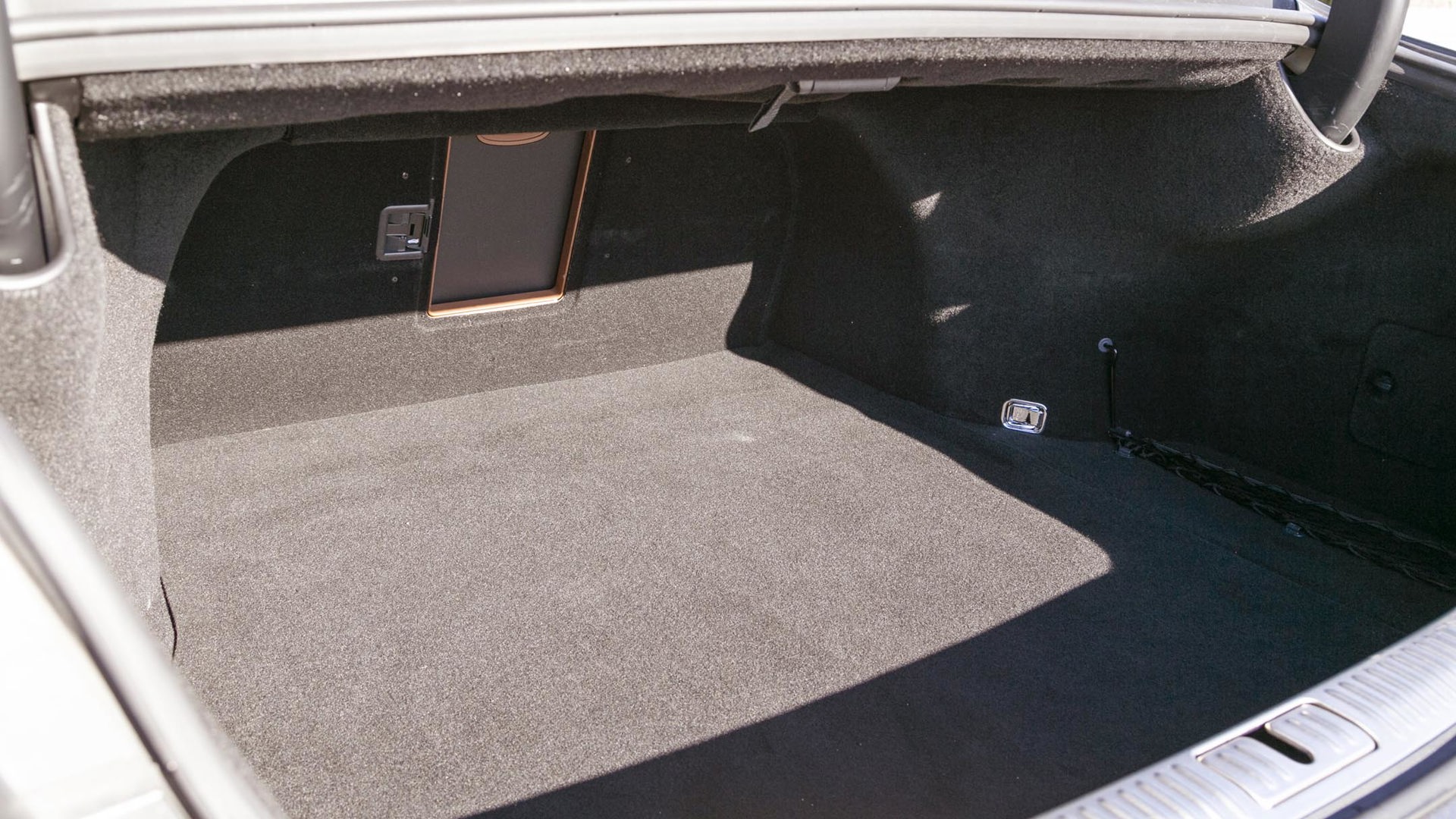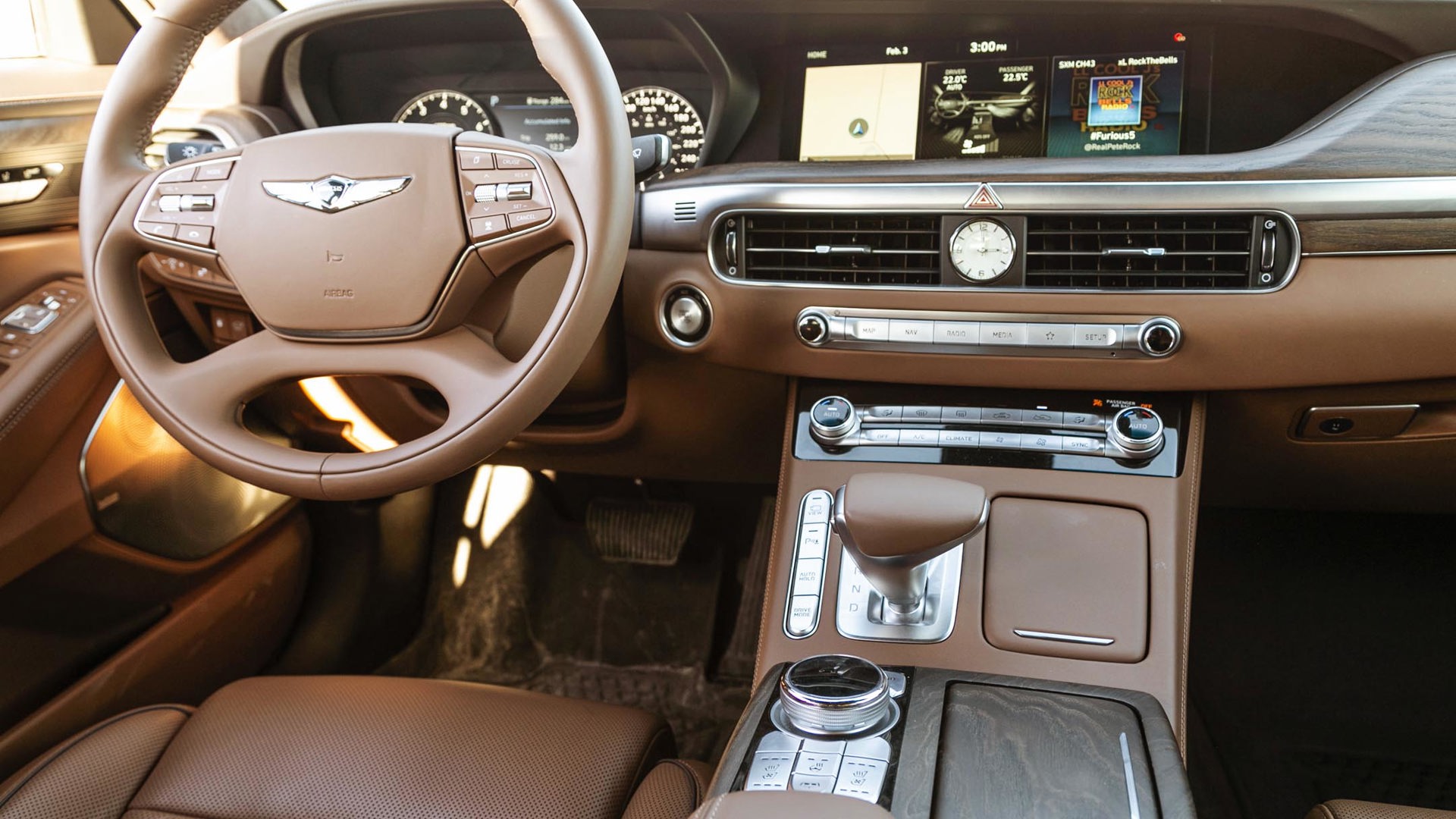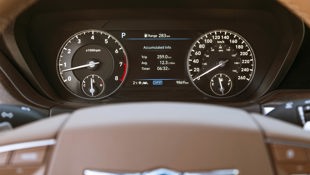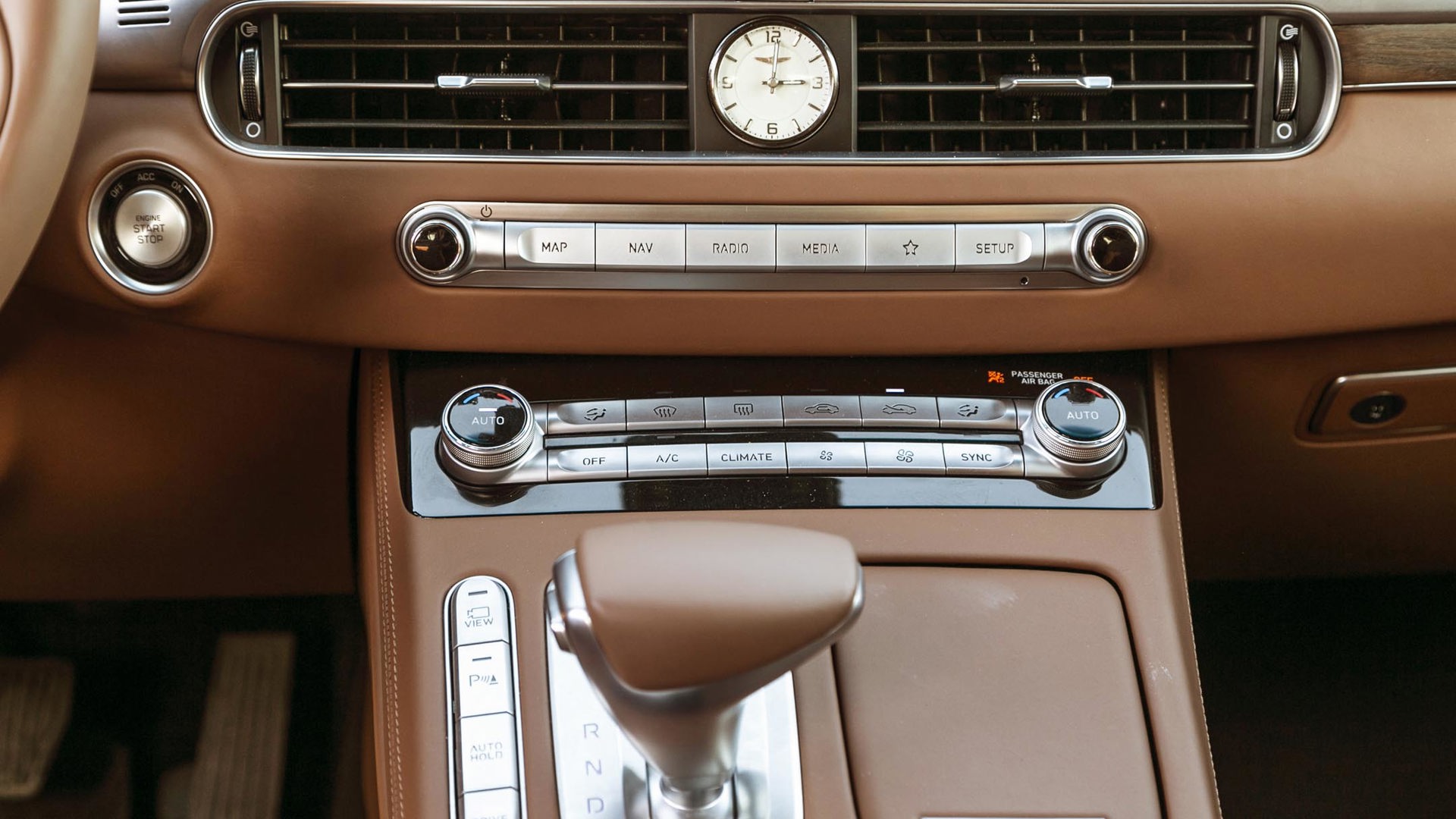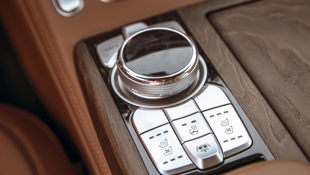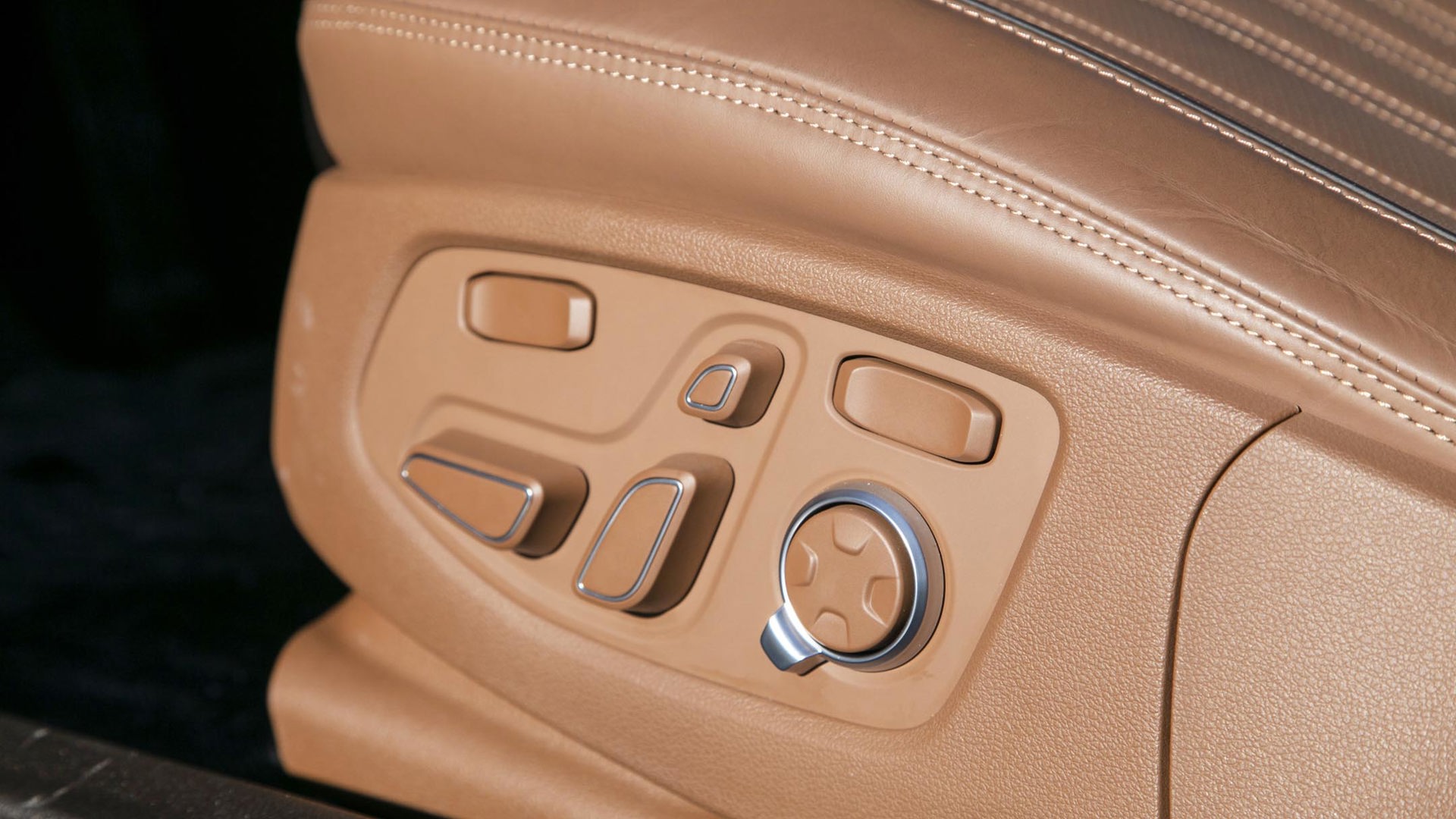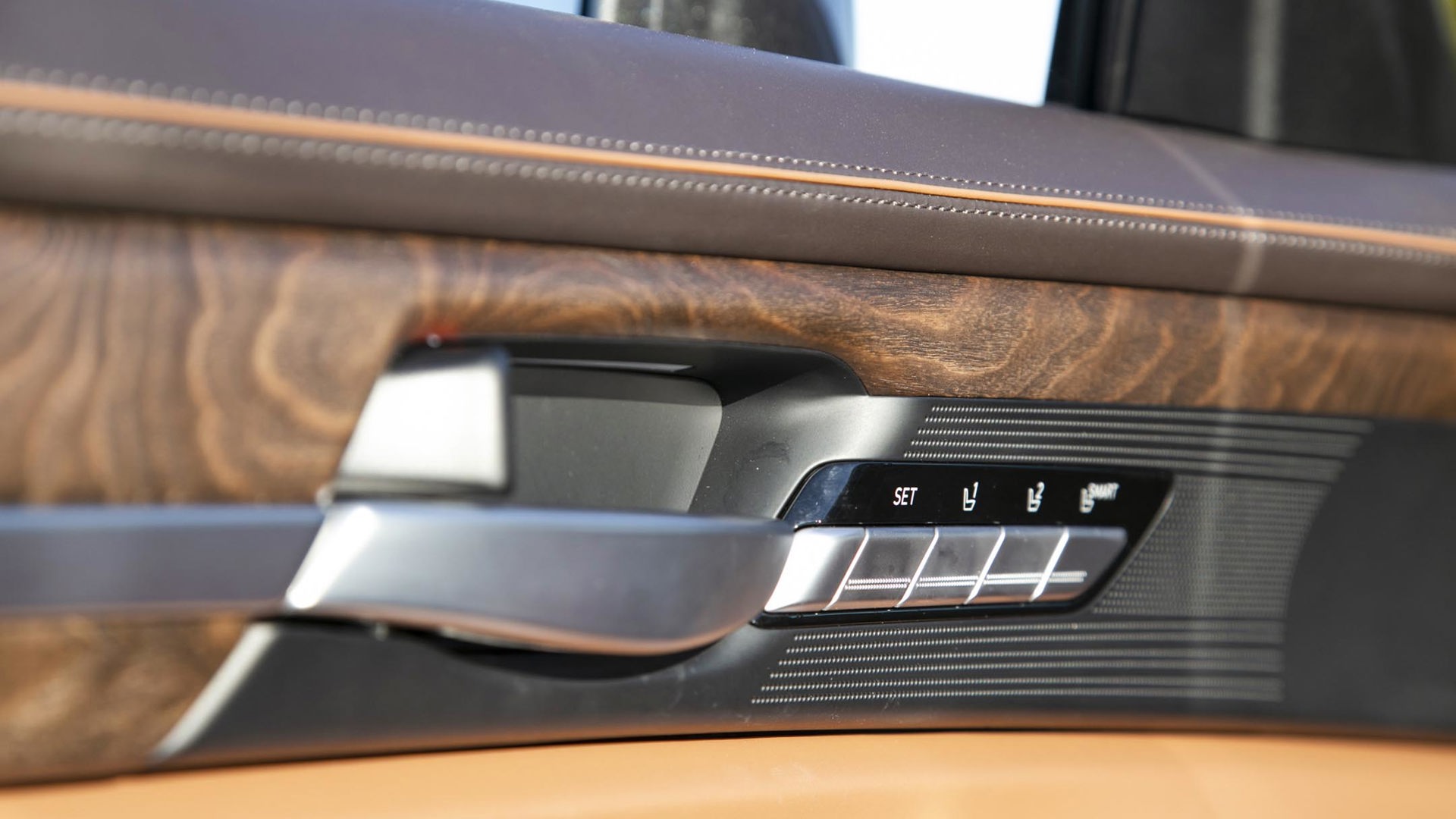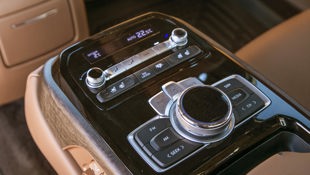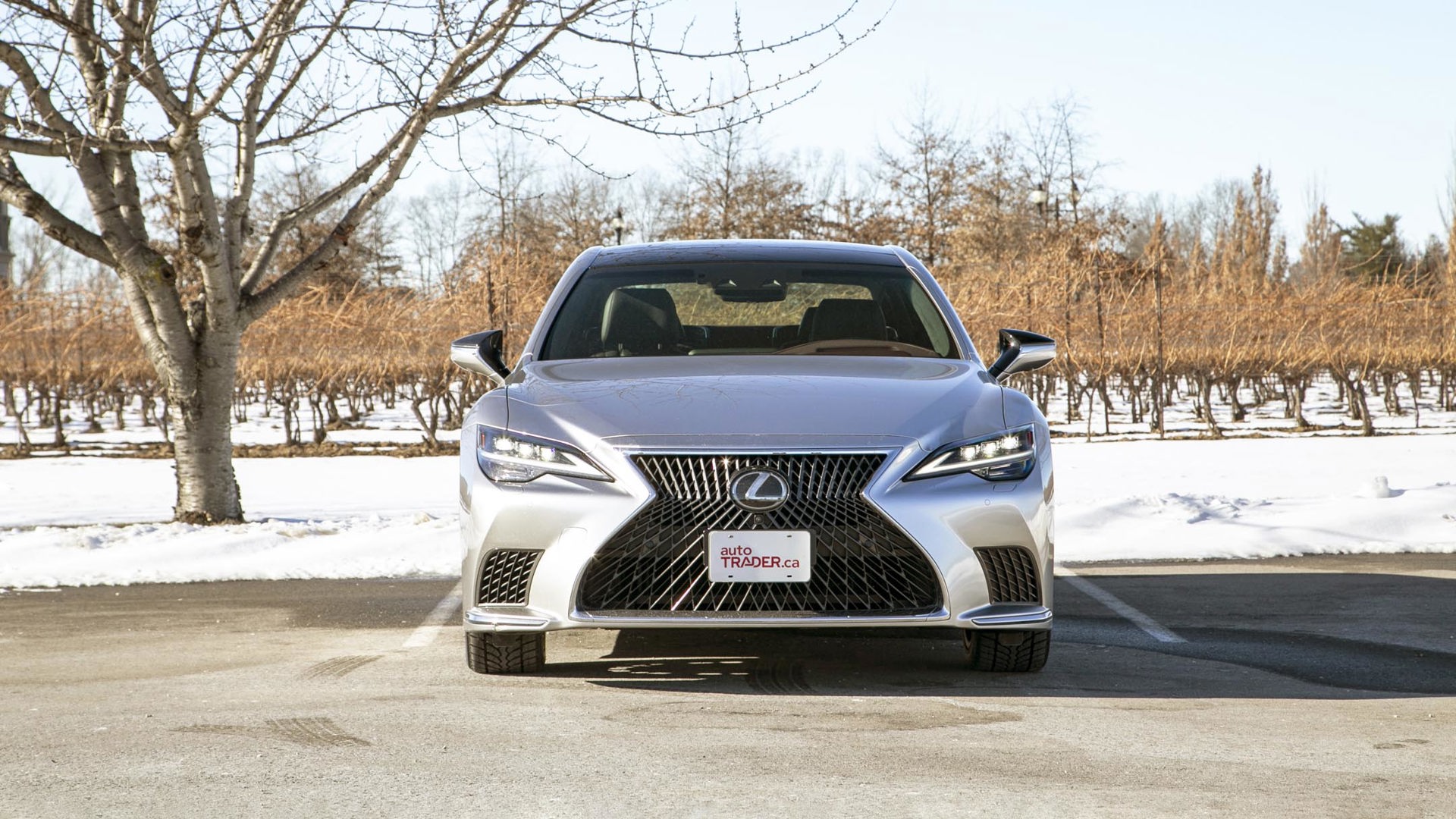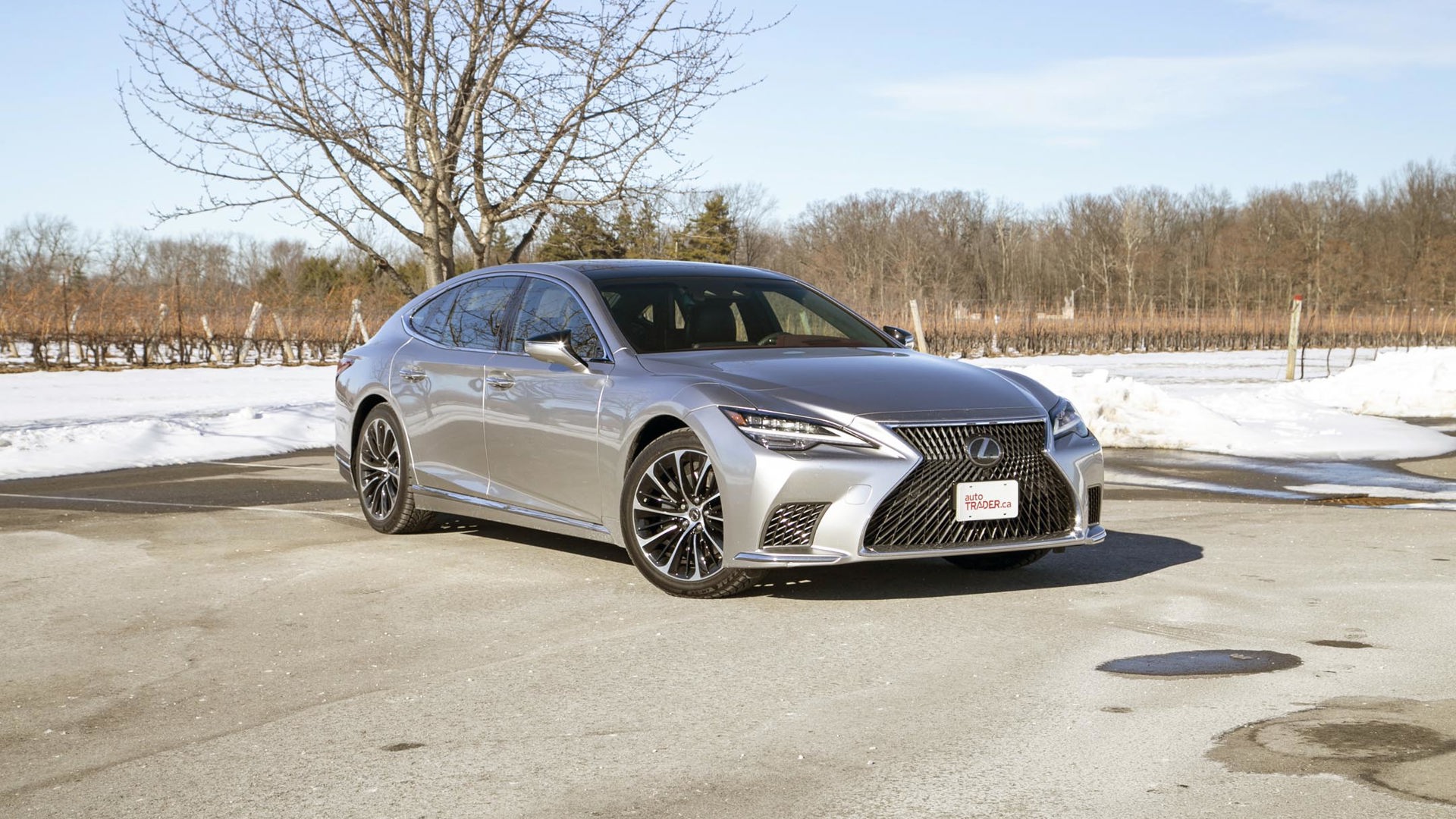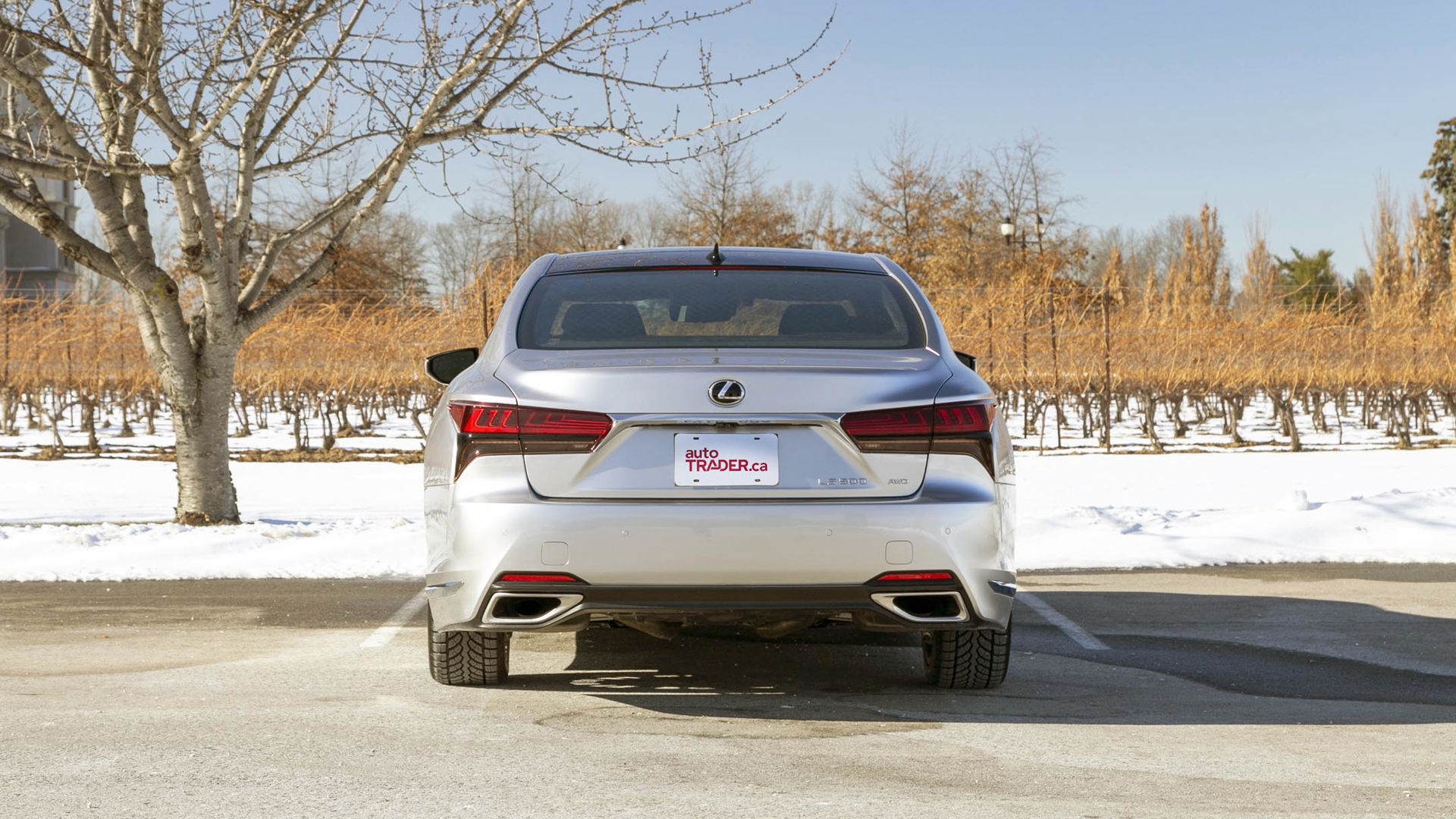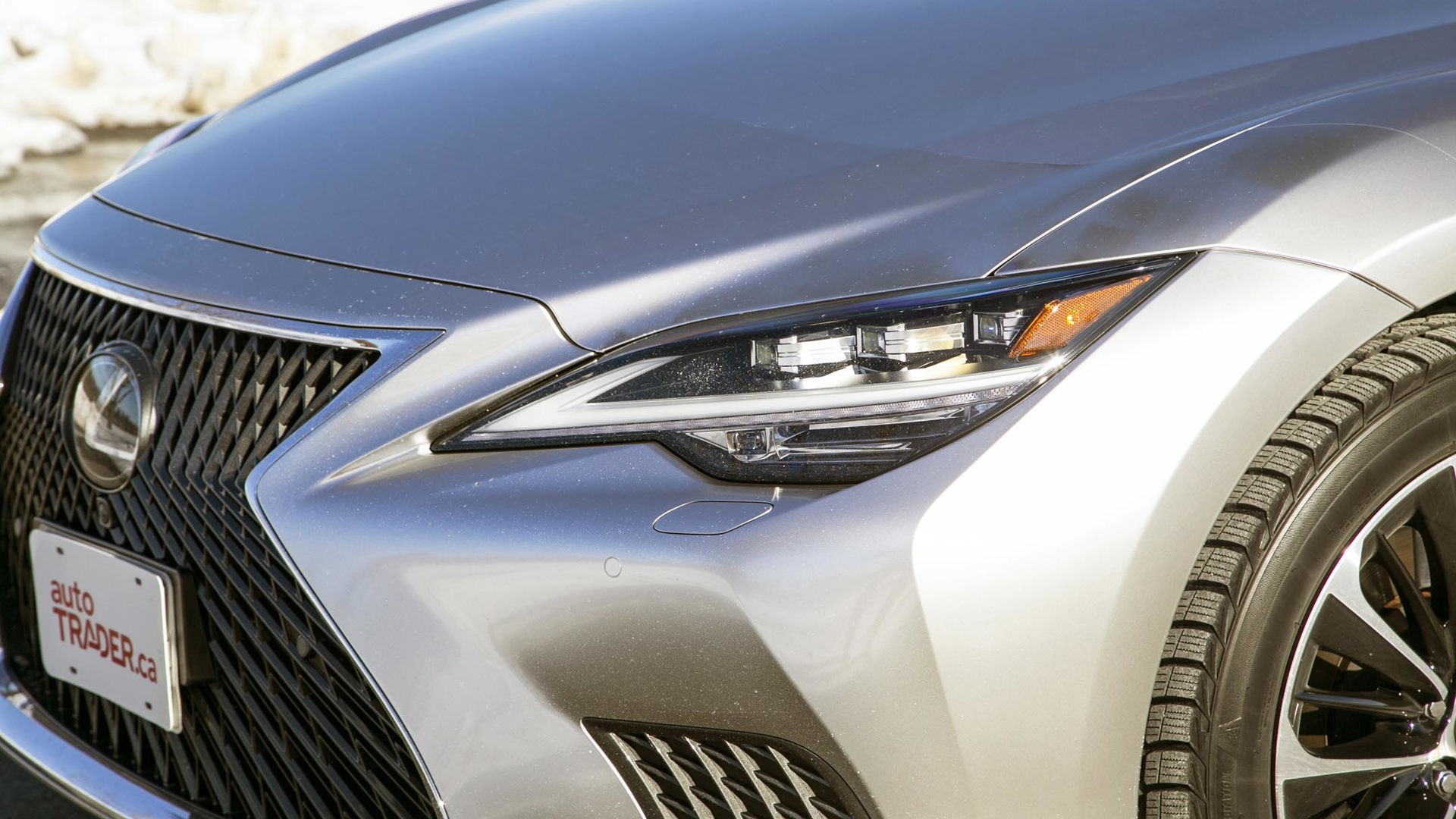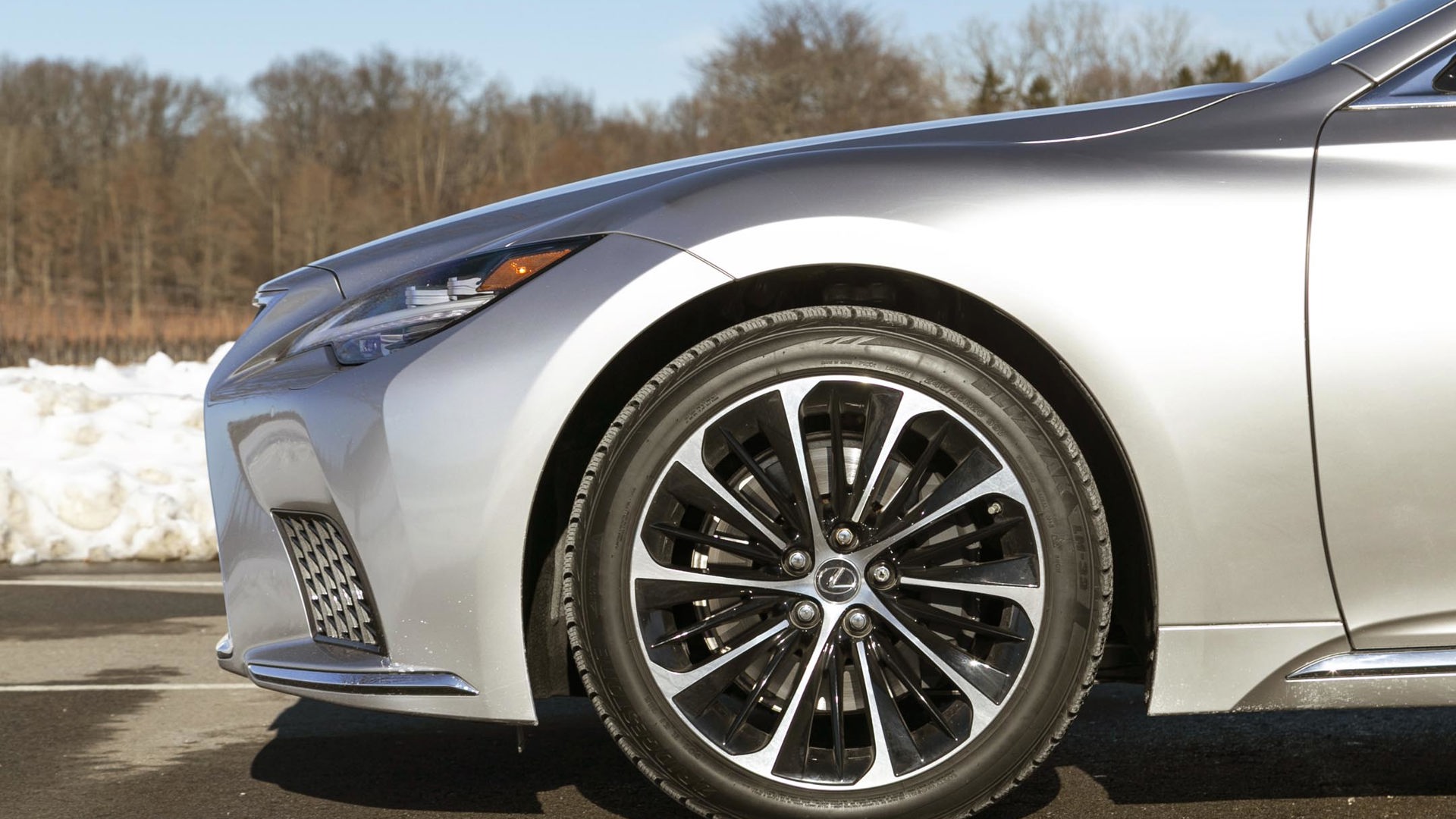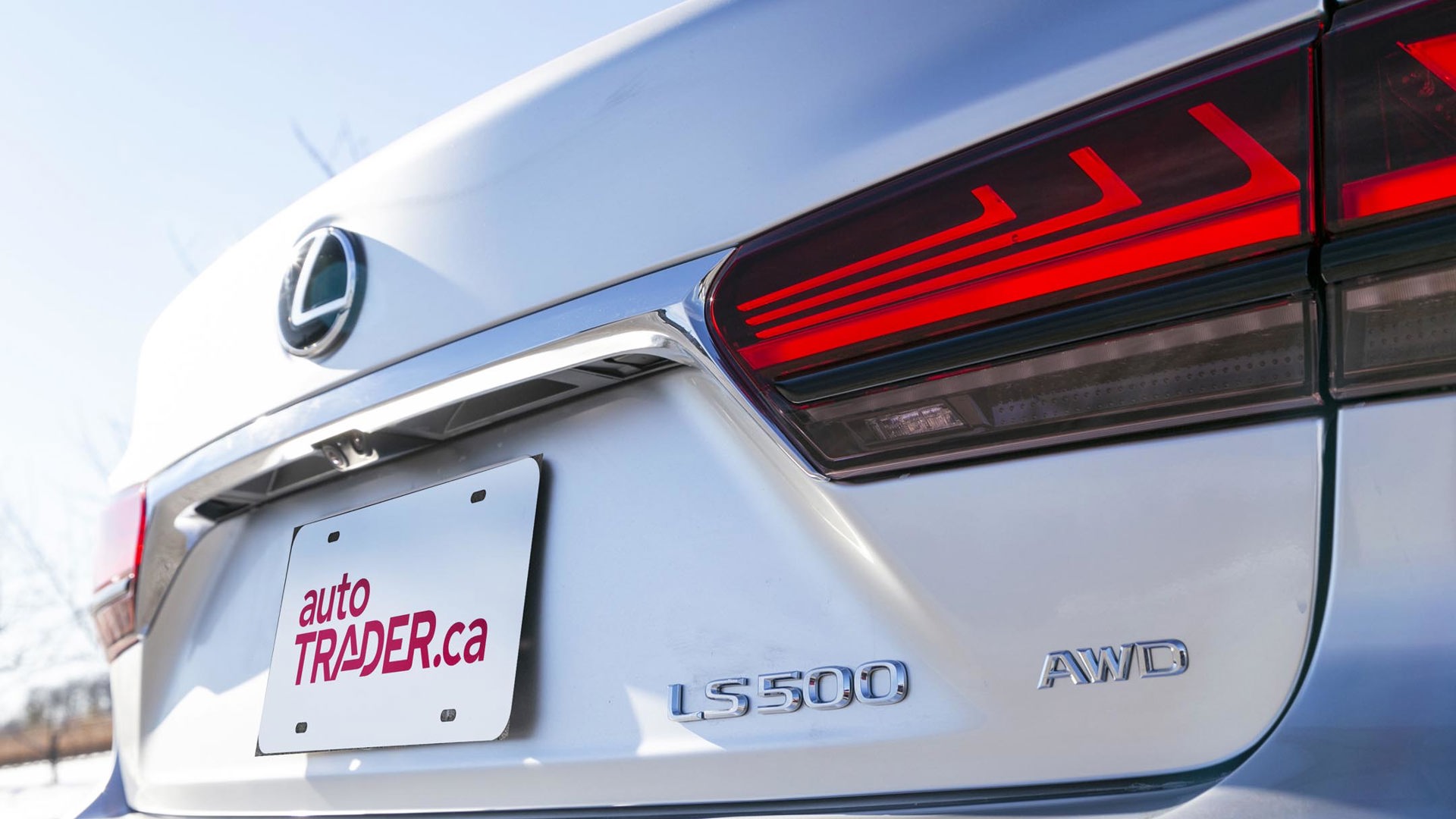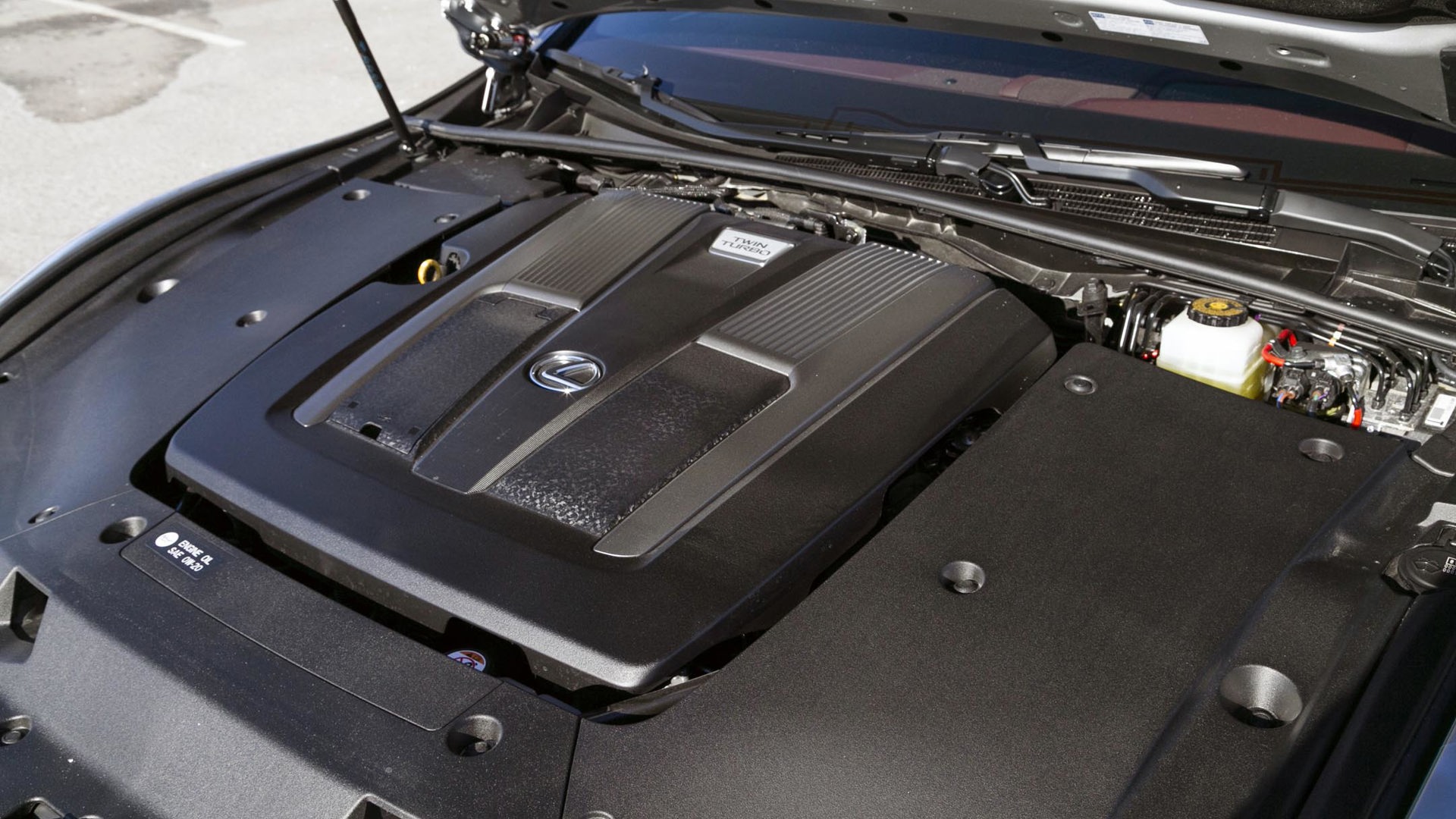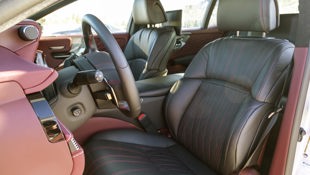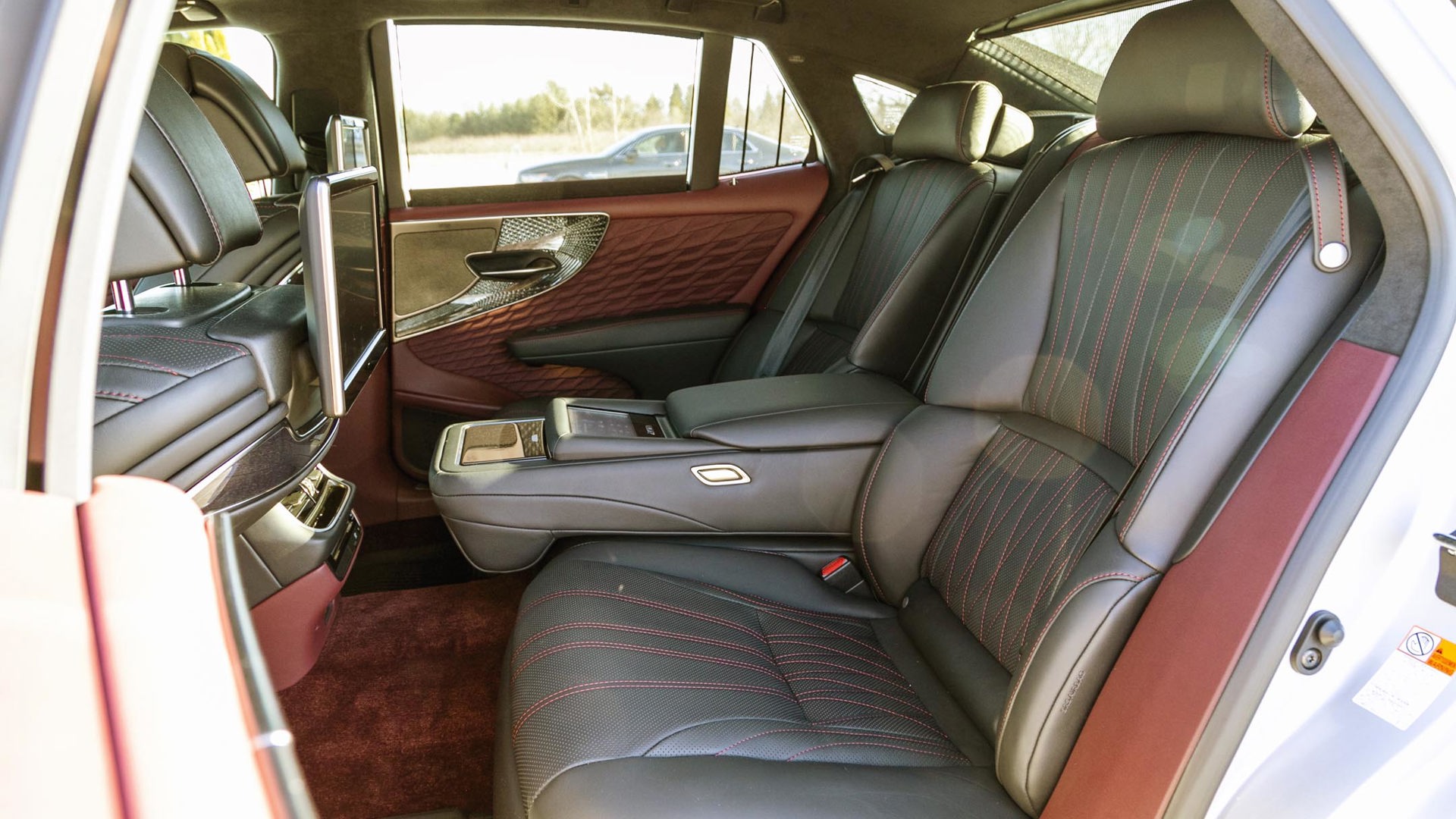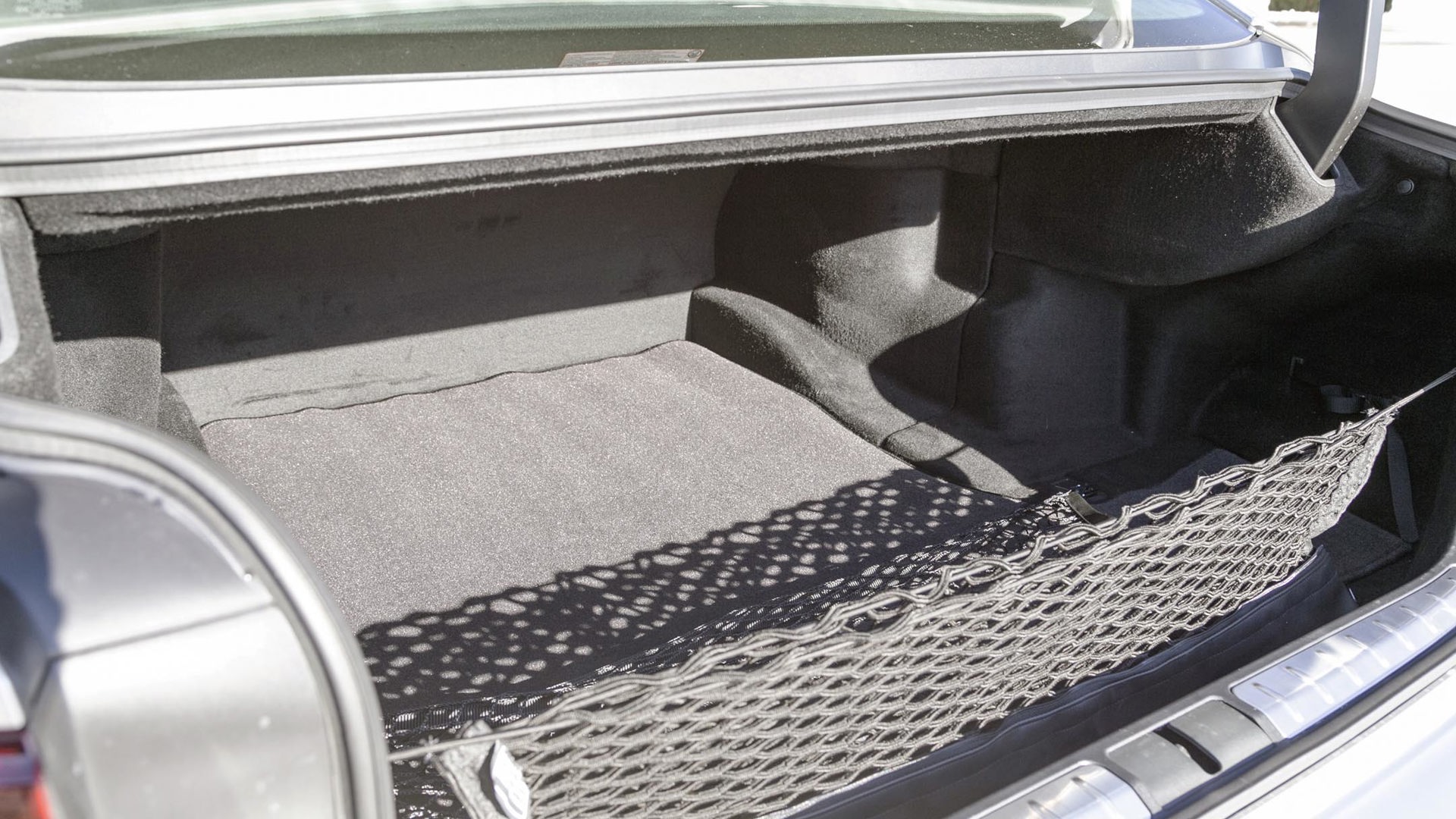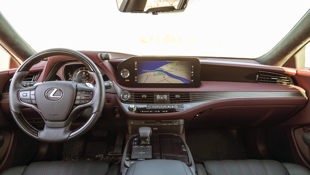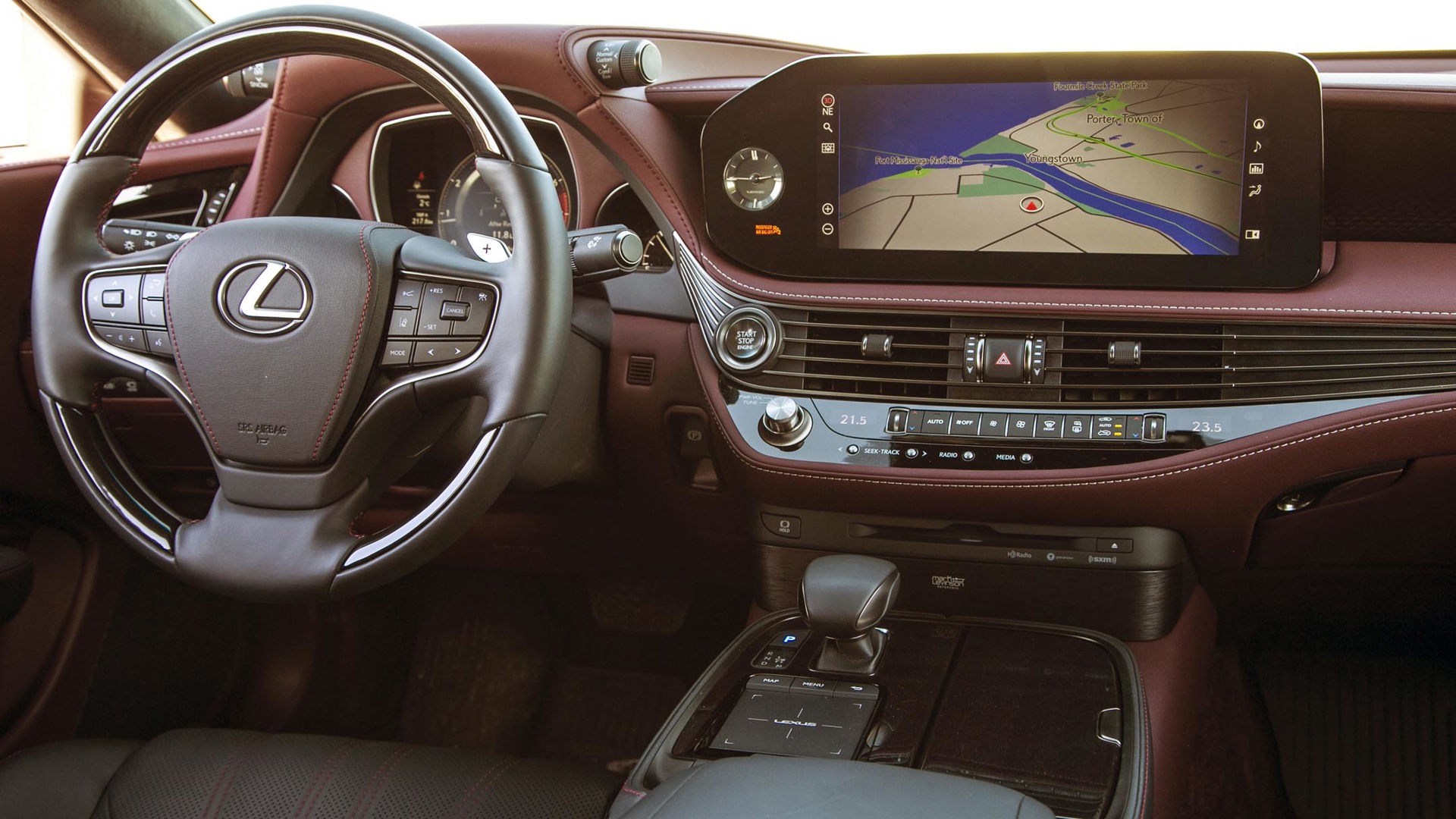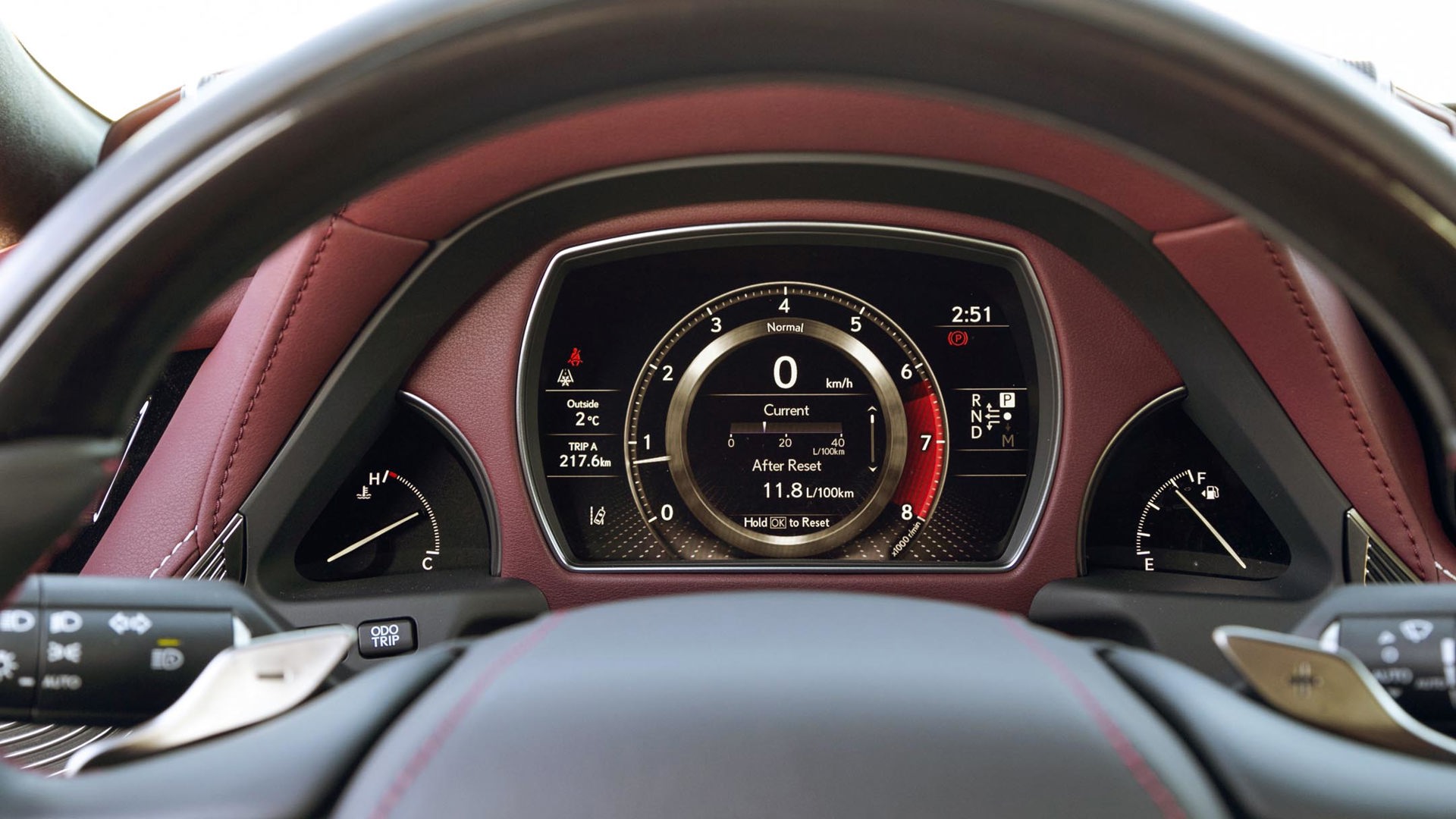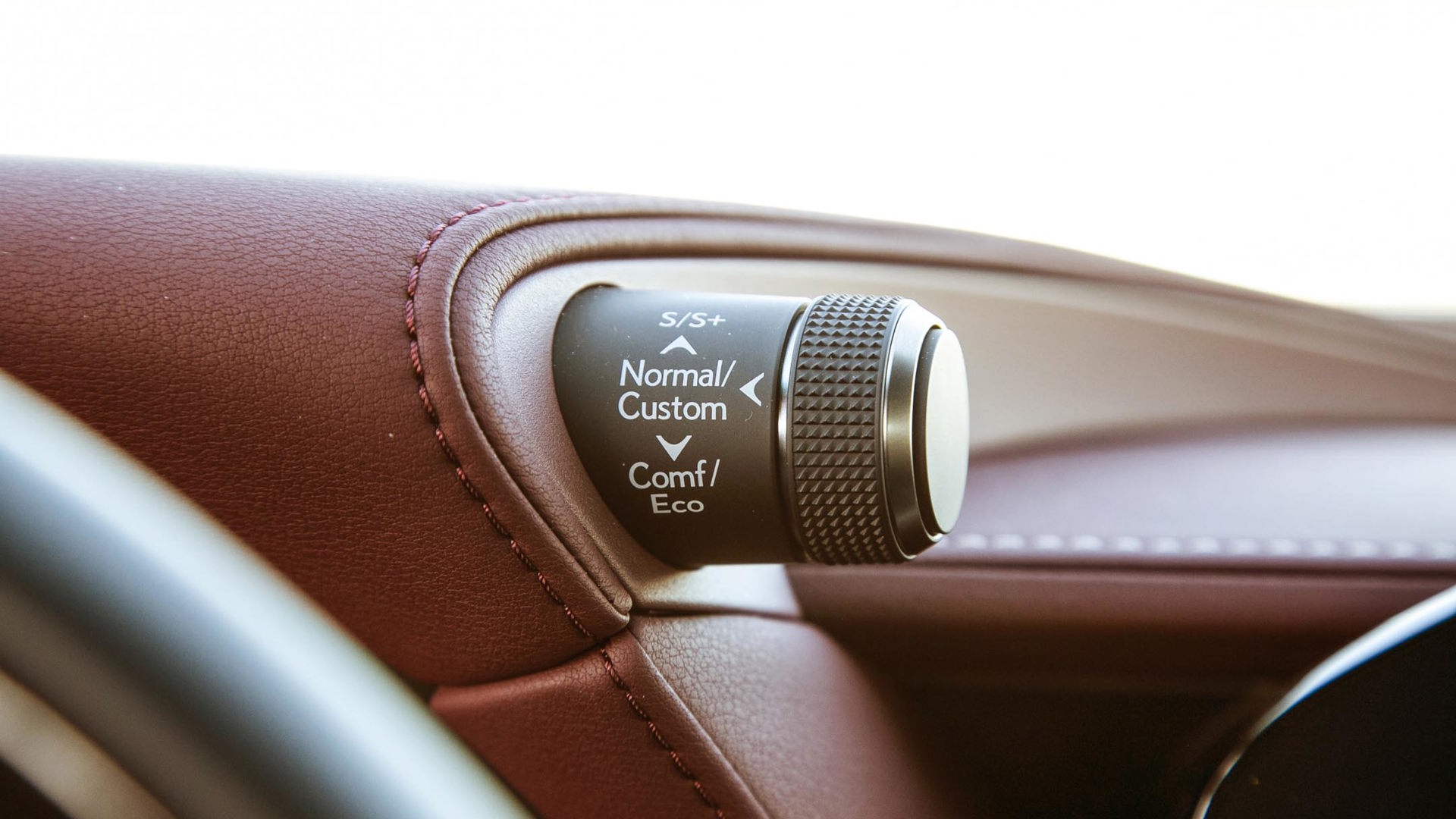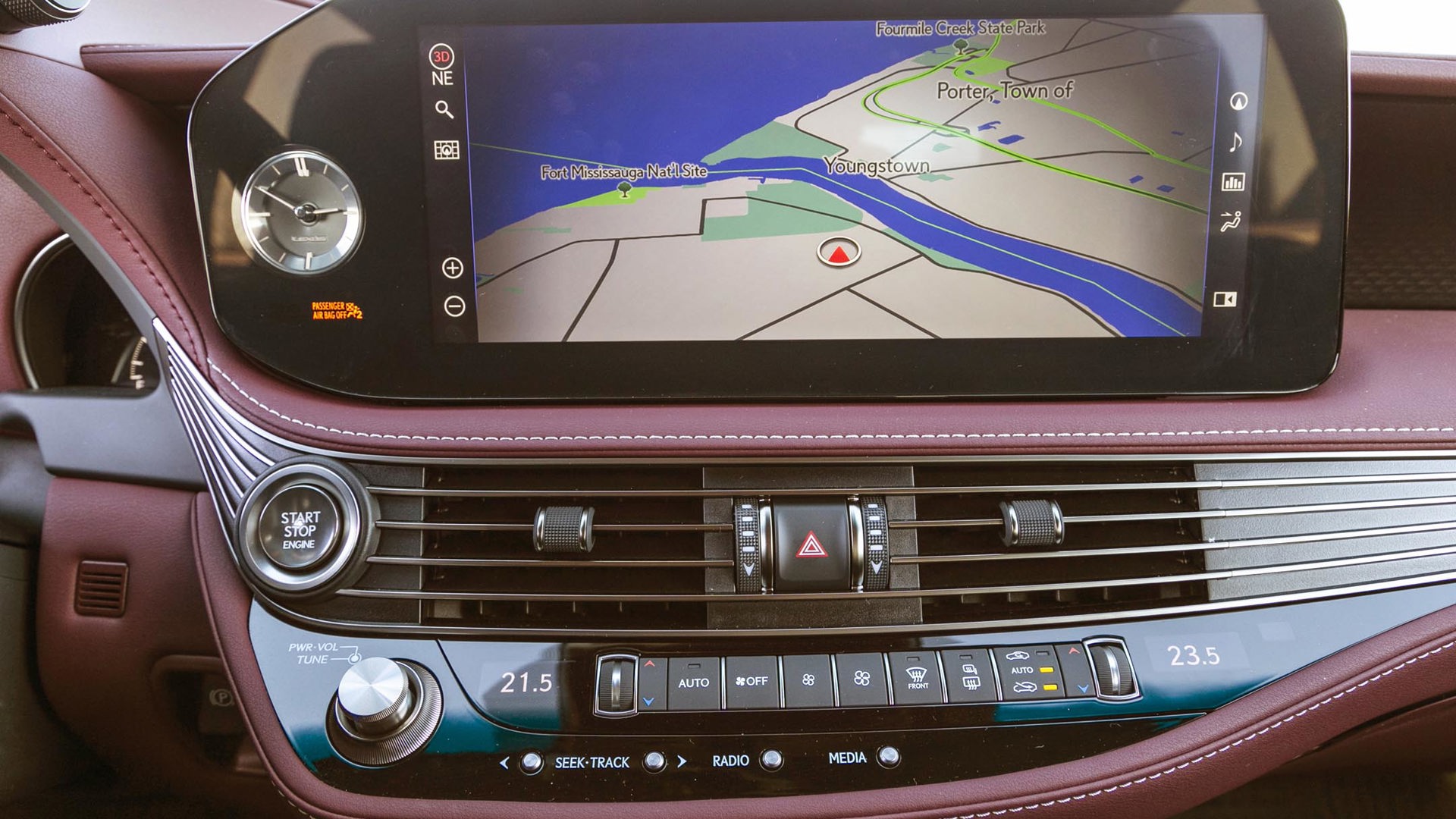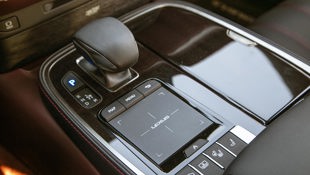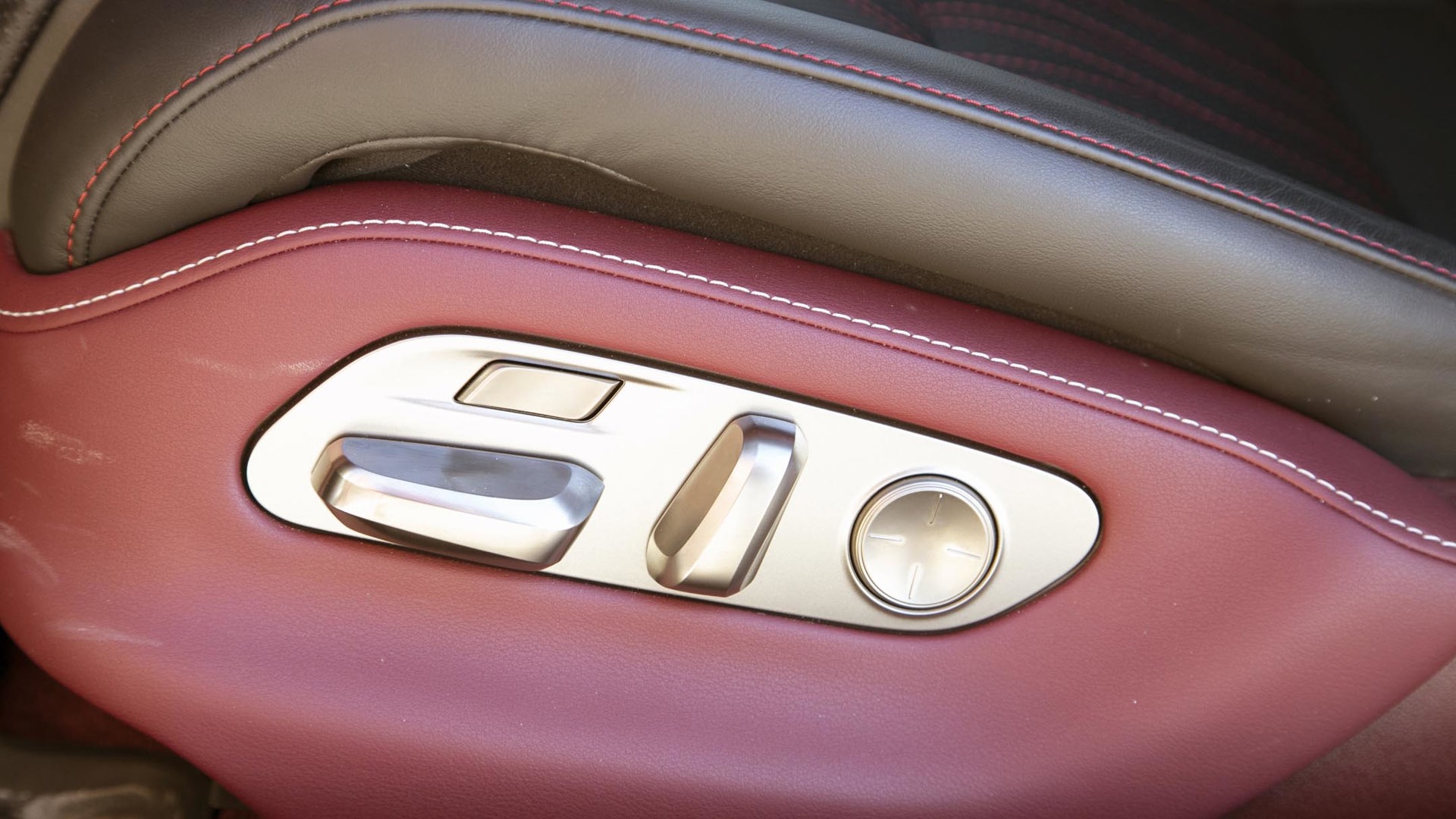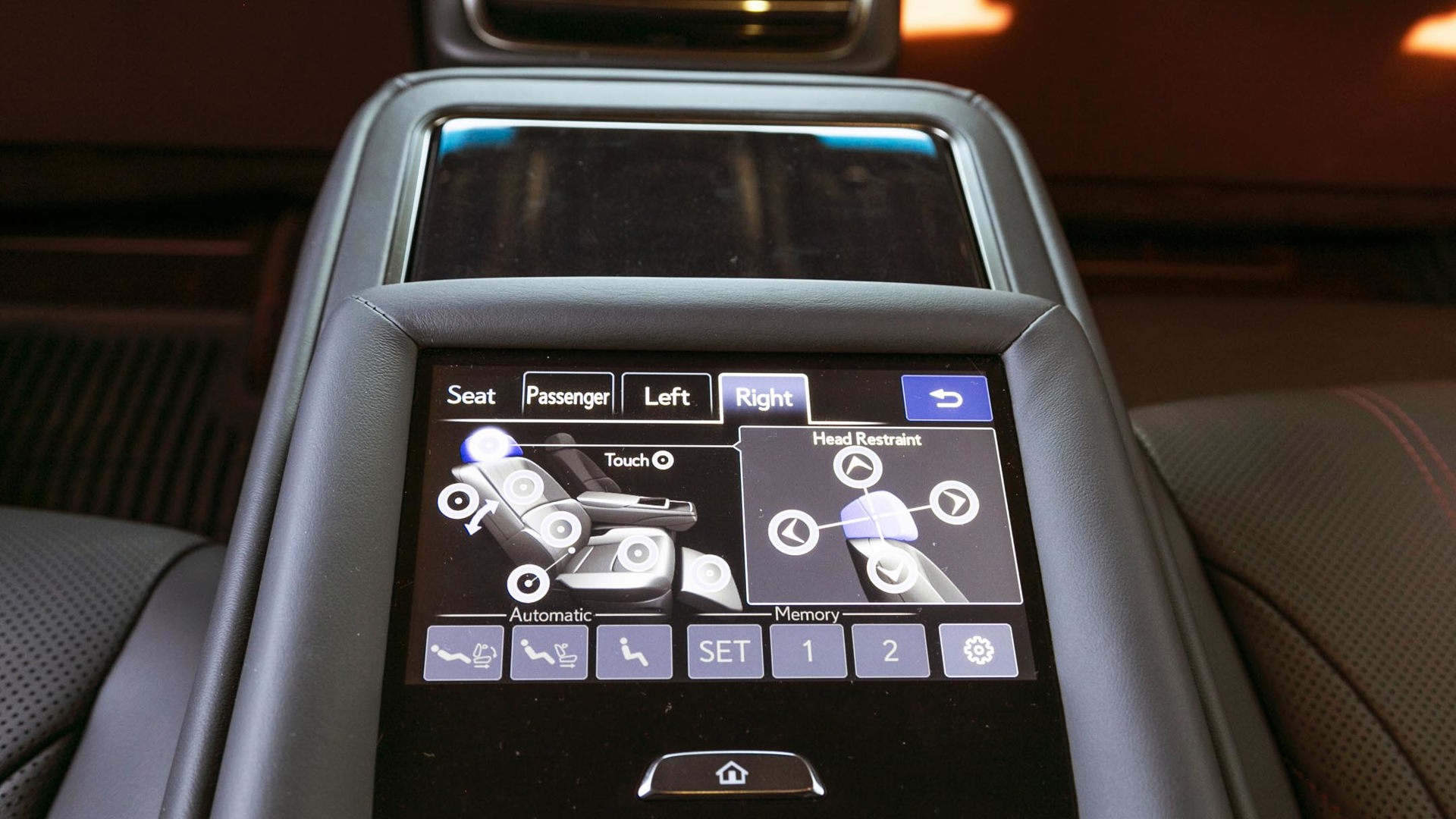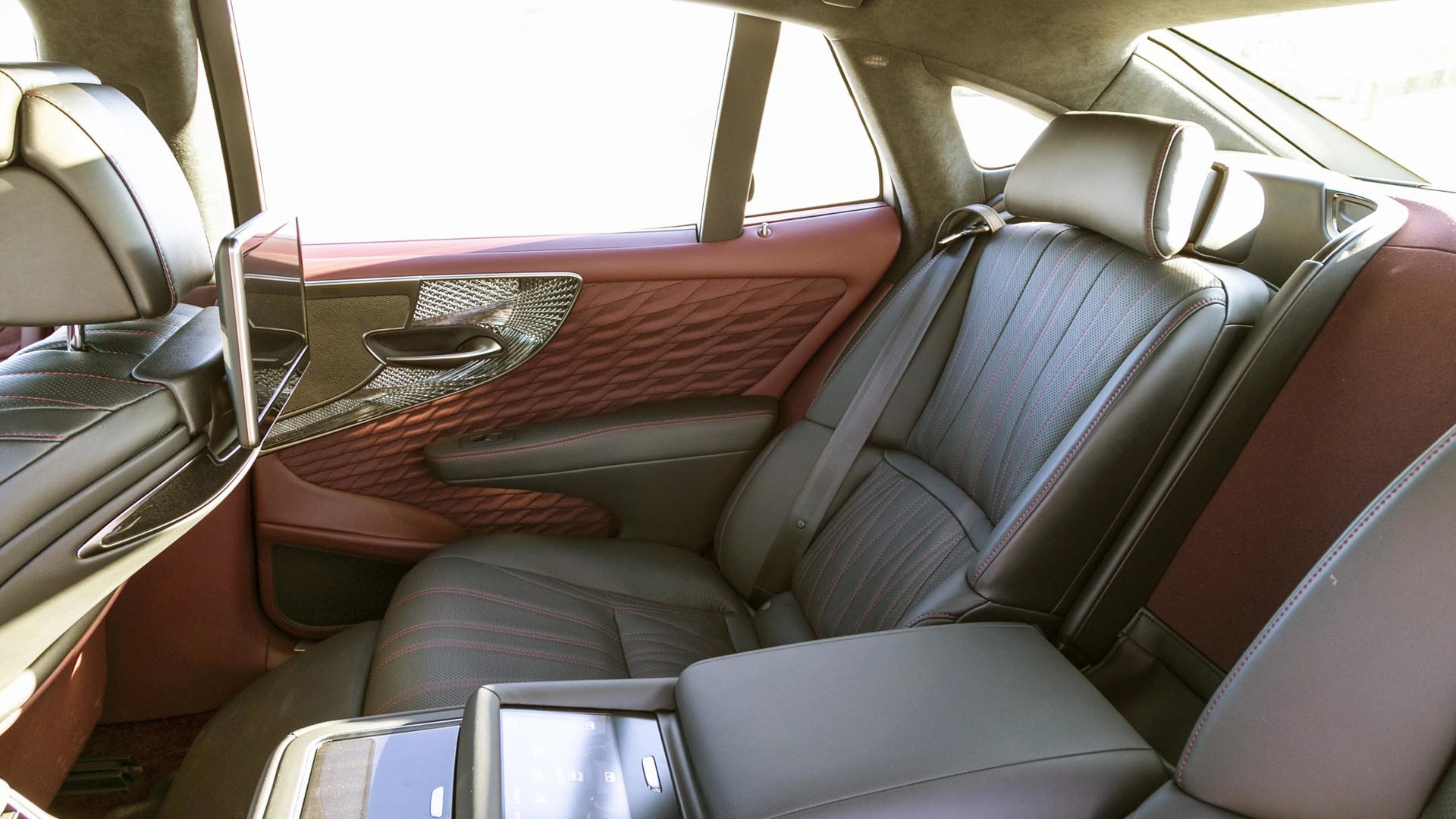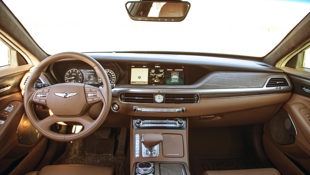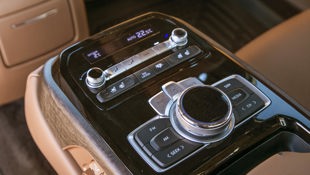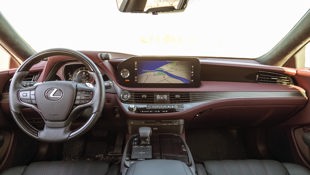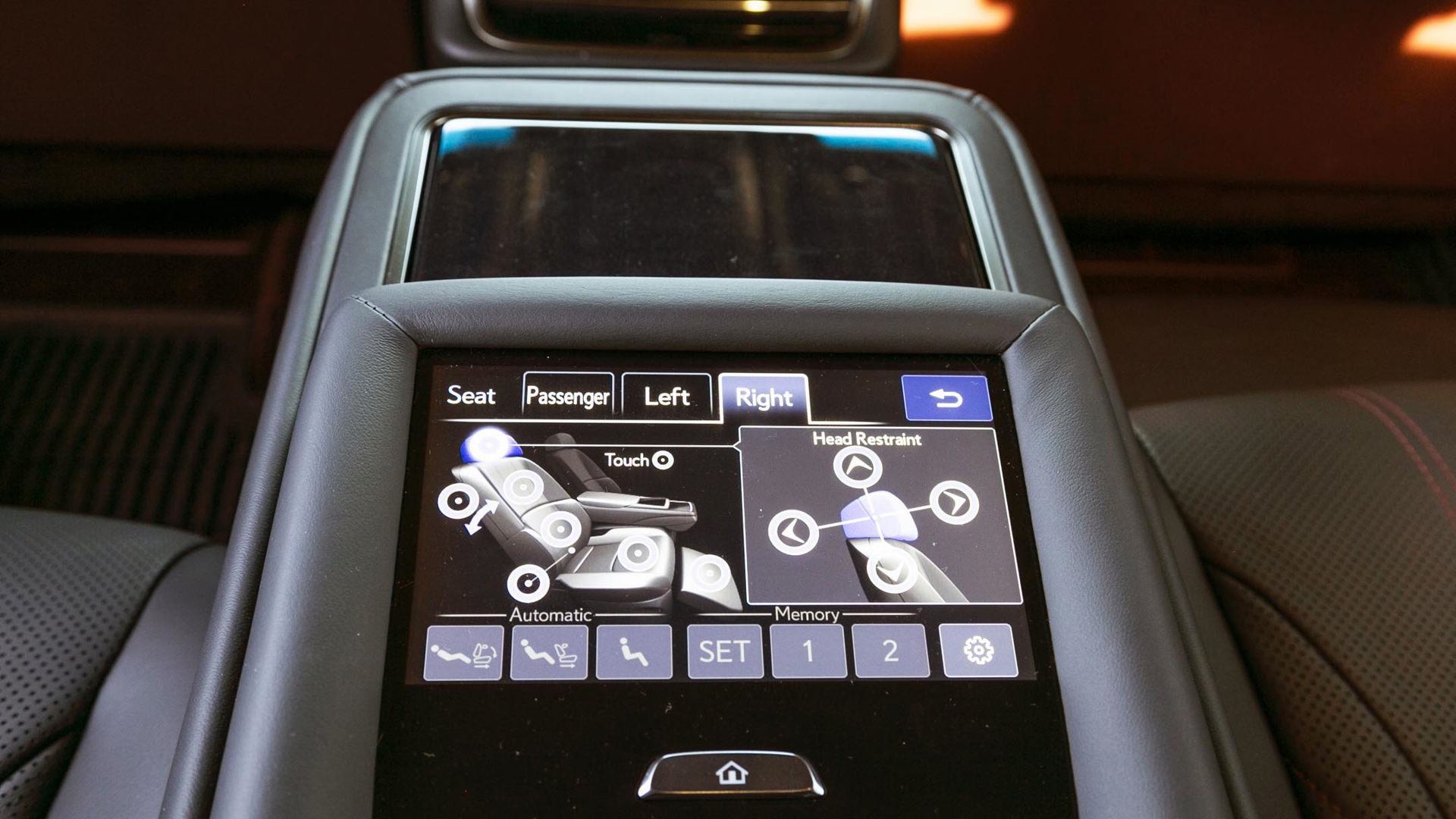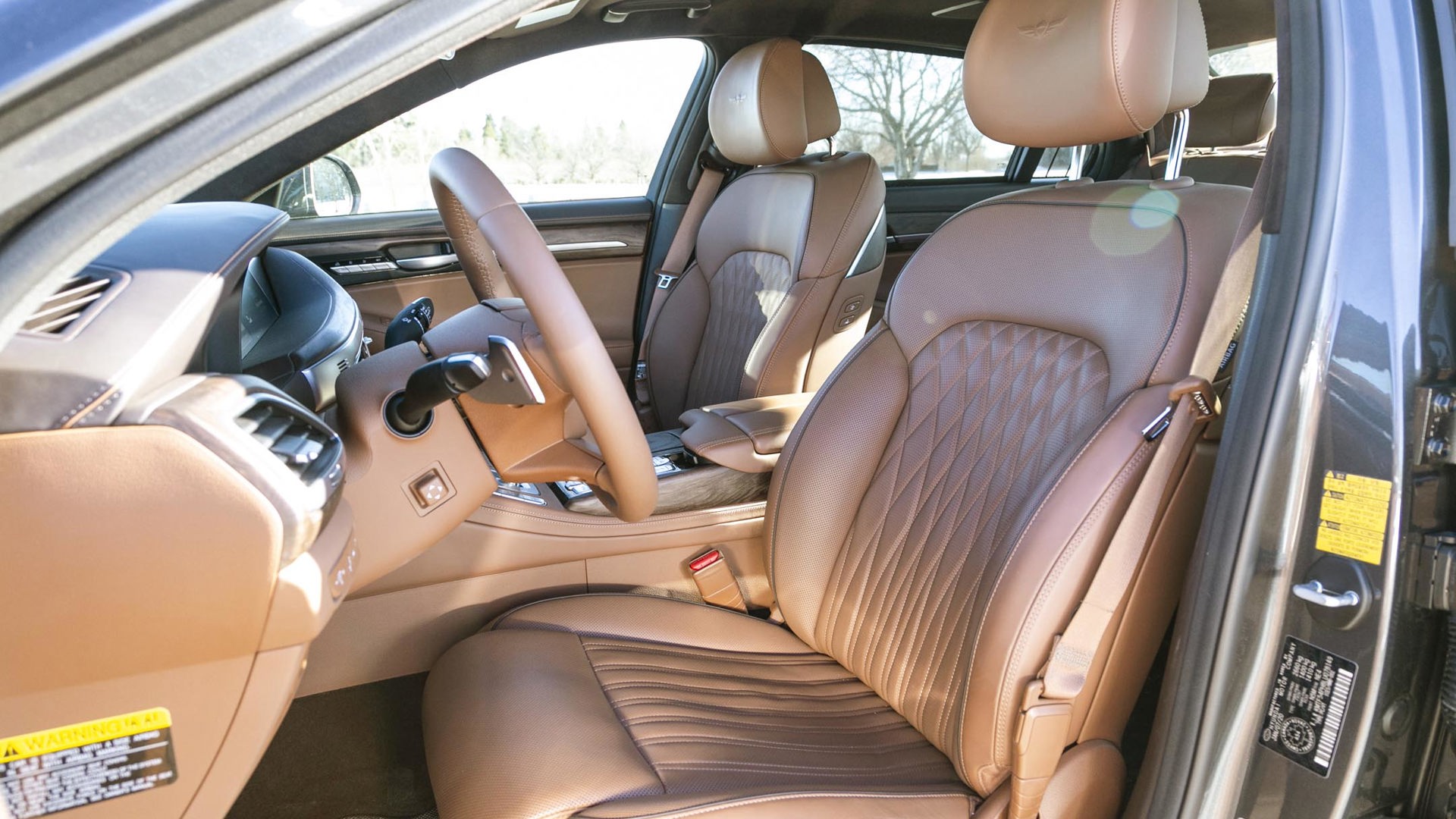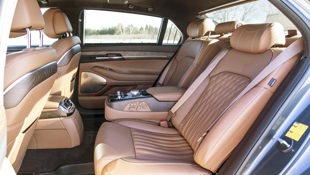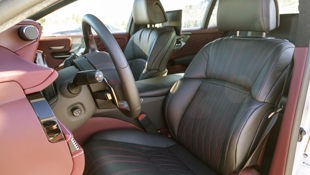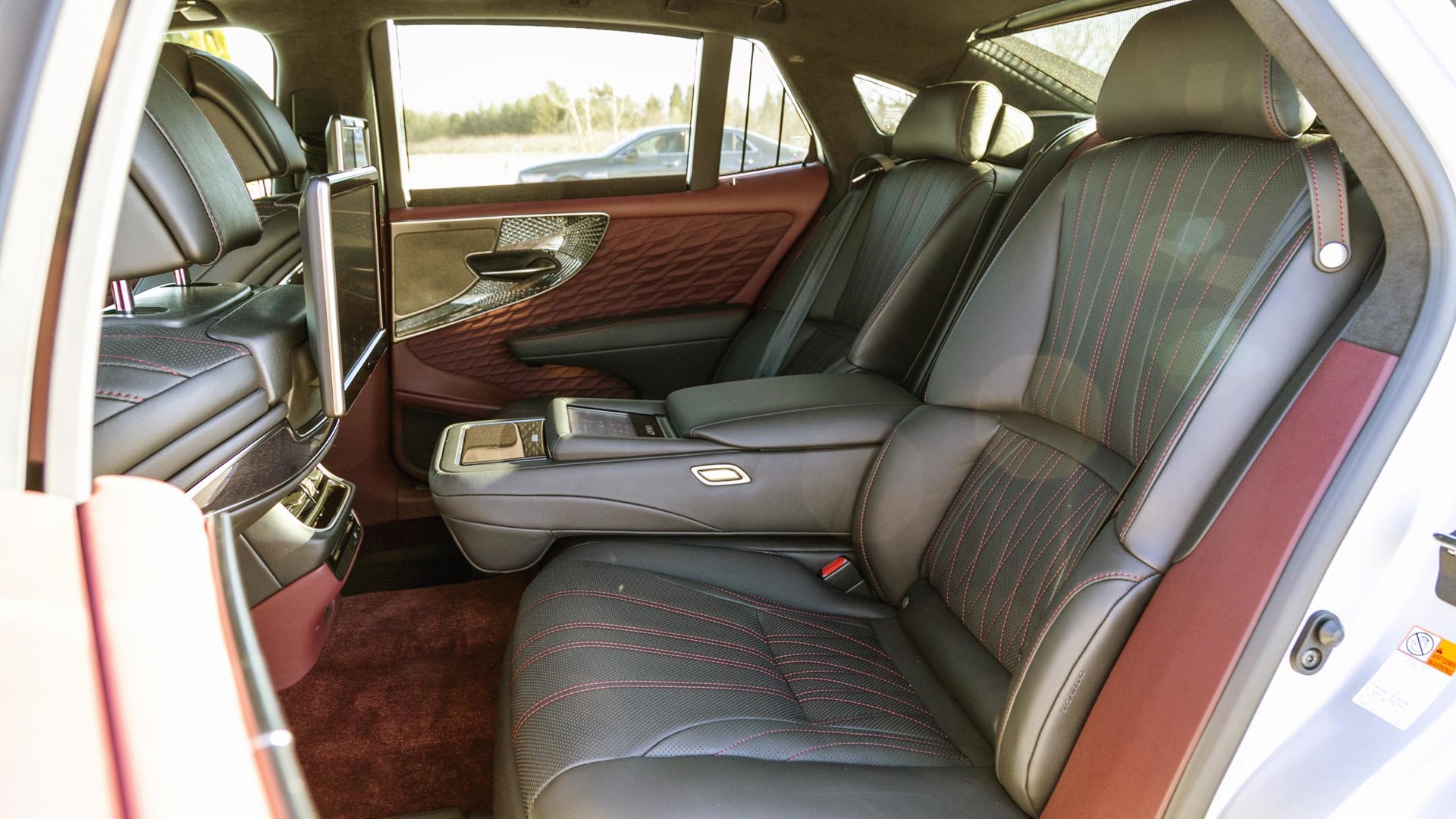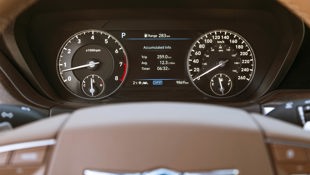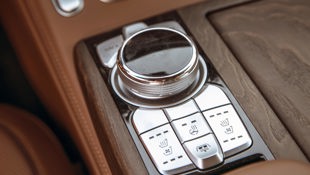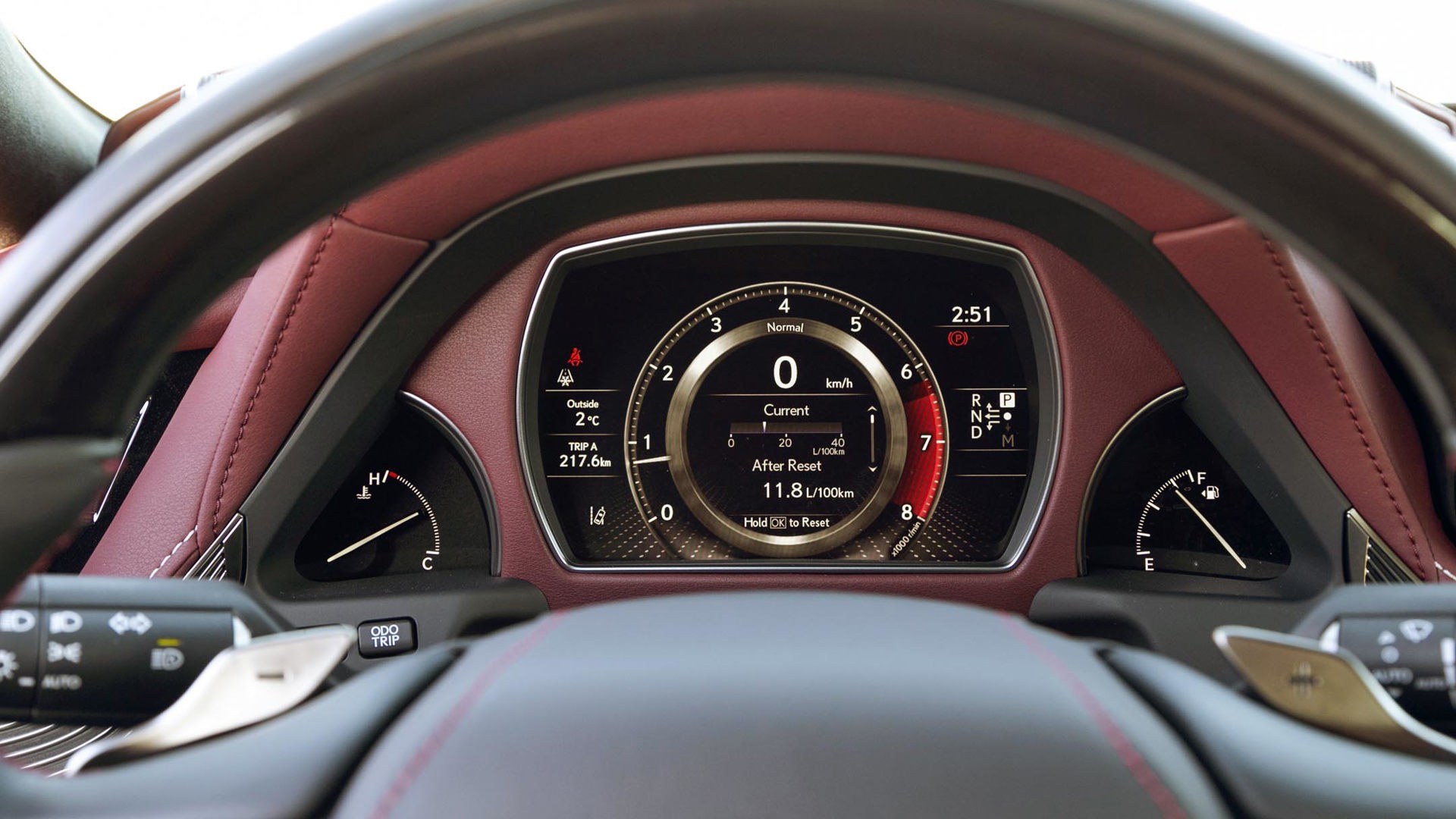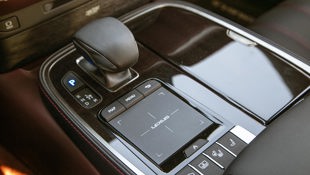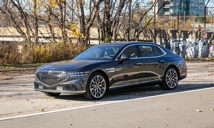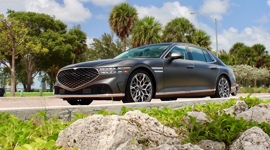Comparison Data
|
2021 Genesis G90 5.0 Prestige AWD
|
2021 Lexus LS 500 AWD
|
|---|---|
|
Engine Displacement
5.0L
|
3.5L
|
|
Engine Cylinders
V8
|
Twin-turbo V6
|
|
Peak Horsepower
420 hp @ 6,000 rpm
|
416 hp @ 6,000 rpm
|
|
Peak Torque
383 lb-ft @ 5,000 rpm
|
442 lb-ft @ 1,600 rpm
|
|
Fuel Economy
15.0 / 10.1 / 12.8 L/100 km cty/hwy/cmb
|
13.8 / 8.7 / 11.1 L/100 km cty/hwy/cmb
|
|
Cargo Space
444 L
|
481 L
|
|
Base Price
$89,750
|
$104,750
|
|
A/C Tax
$100
|
$100
|
|
Destination Fee
Included
|
$2,095
|
|
Price as Tested
$89,850
|
$141,545
|
|
Optional Equipment
None
|
$34,600 – Executive Package, $25,650; Silver Illusion paint, $3,350; Kiriko Glass Trim, $5,600
|
With the introduction of the first Lexus model in 1989, Toyota dropped a live grenade in the lap of the European luxury car companies.
The LS 400 was the flagship of a then-new premium brand from the Japanese carmaker, and the company’s colossal investment in resources and engineering paid off as Lexus earned global respect right out of the gate, proving it could produce a luxury car as good as – or better – than the competition. What’s more, the LS 400 cost notably less than a comparable BMW or Mercedes-Benz.
At the same time, Korean car company Hyundai was trying to increase its North American foothold at the other end of the automotive market, offering basic vehicles powered by dated Mitsubishi drivetrains. The company’s three models offered affordability and not much else.
During the subsequent three decades, Lexus has maintained its position as one of the most popular – and well-built – premium car brands in the world. Hyundai, meanwhile, has worked astonishingly hard to shed its entry-level status, becoming one of the world’s top carmakers, and even launching a premium marque of its own along the way.
While Genesis is too new to determine if its models will have the long-term durability that’s enjoyed by Lexus owners, the brand continues to rack up awards at an astonishing rate – including a few from autoTRADER.ca. Recently, the Genesis G90 earned the distinction as the Best Large Luxury Car.
So where does that leave the recently updated 2021 Lexus LS – a car that blazed a trail for the Genesis G90 a little more than 30 years ago? With keys to both in hand, we thought it rather fitting to pit these particular flagships against one another in a luxury sedan showdown, which brought into focus just how different they are in execution.
Styling
It’s taken some time, but both autoTRADER.ca Editor-in-Chief Jodi Lai and your humble author have grown to appreciate the giant spindle grille Lexus has employed since 2014. We’ll still stop short of calling it beautiful, but it’s distinctive – and it’s unmistakably Lexus. For 2021, the headlights and grille shape have been tweaked, but only subtly.
The LS 500’s profile is long, low, and sweeping from nose to tail with fluid curves, a pinched greenhouse, and a sensational coat of pricey Silver Illusion paint that looks absolutely liquid on this car but adds $3,350 to the price.
In contrast, the Genesis appears presidential. Its doors are comparatively slab-sided and its tall side glass exaggerates the 35 mm (1.4 in) of extra height it has over the Lexus. Genesis designers have done a great job of creating a strong family resemblance across the model line, and the G90’s grille, light treatment, and side markers are familiar in the brand’s other models. The wheels deserve special mention with their intricate, woven pattern that could only look appropriate on such a premium car. Jodi summed up the overall styling as “stately,” while calling the Lexus “elegant.”
Climb inside either car, let the soft-close door latch itself, and you’ll become ensconced in a lavish isolation chamber. The G90’s cabin looks downright delicious finished in butterscotch-coloured leather with cocoa accents. [Please, Jeff, you’re making us hungry. – Ed.] The diamond-pattern stitching on the seats is a classic touch, and the real wood and metal accents provide just the right amount of contrast.
On the other hand, the LS 500 it’s up against is another level of posh altogether. While this optional black-and-red colour scheme is nothing new, Lexus has applied a sense of artistry to the cabin that I’ve not seen this side of a Rolls-Royce. The door panels in particular are breathtaking, with swaths of origami-like folded fabric punctuated by a plate of glass trim that sparkles from an endless number of angles, day or night.
The dashboard styles feature similarly contrasting approaches. The G90’s look recalls luxury designs from the 1960s and ’70s with a broad slab wearing lots of wood grain, whereas the Lexus’ dash rises and falls with waves of red leather and dark trim, anchored by a large glass panel for the infotainment system.
G90: 8/10; LS: 9/10
Comfort
The comfort of both front and rear seats must be measured equally here since either of these machines is as likely to find duty as a chauffeur-driven limo as it is an executive daily driver.
The G90 and LS 500 trade off in some crucial areas of comfort. The Lexus offers massaging seats front and rear, while the Genesis has none. Still, both cars feature highly adjustable front seats that are both heated and ventilated, but despite all the adjustability – and massage settings – the Lexus thrones couldn’t offer the same level of comfort and support for me as the G90’s.
The rear seats in both cars recline and enable occupants to heat or cool their posteriors, but the Lexus’s Executive option package also allows the unoccupied front passenger seat to be moved forward and an ottoman to rise up, allowing the rear passenger-side occupant to lay out nearly straight (while enjoying that massage, no less). There is not a single piece of furniture in my home as comfortable as that Lexus rear seat.
The LS offers more rear legroom than the G90, but its headroom – particularly in the rear – is surprisingly compromised. The taller side glass in the Genesis also makes for a less claustrophobic cabin, too.
G90: 9/10; LS: 9.5/10
Features
Anything that can make terrestrial travel pleasant is found in top-level sedans like these. Aside from the lavish materials surrounding the occupants, both cars offer sunroofs, though the LS 500’s is a much larger panoramic unit versus the standard one in the G90.
The sound quality of the G90’s 17-speaker audio system is outstanding, but the 23-speakers in the Lexus are better still, possibly taking the award for the best I’ve experienced in any car. Add to that the LS 500’s dual rear-seat screens with Blu-ray player and HDMI inputs, and even Hollywood bosses can keep up with their chores on the go.
While neither car offers a semi-autonomous driving suite like Tesla, both adaptive cruise control systems work in stop-and-go traffic, and their lane-keeping assist helps keep them between the lines. However, Genesis has done a much better job tuning its system to feel more natural in traffic, accelerating smoothly and keeping a reasonable distance from the vehicle ahead, and centred in its lane, where the Lexus is constantly busy wandering back-and-forth between the lines.
G90: 9/10; LS: 9.5/10
Safety
Automotive technology flows from the top down, and everything in each manufacturer’s safety repertoire is standard equipment with these two machines, with the exception of the optional rear seat-mounted airbags that bring the supplemental restraint system count up to a dozen in the Lexus. Both cars offer dynamic crash avoidance front and rear with active braking systems and lane departure mitigation, plus they’ve each got excellent adaptive LED headlights.
G90: 10/10; LS: 10/10
User Friendliness
A distinct benefit to the more traditional interior layout of the Genesis is its relative ease of operation. Despite the multitude of features found in the G90, the location of the controls and the way they function is entirely intuitive. Apple CarPlay and Android Auto are cleanly integrated, too. The 12-inch screen is easily operated via touch, or with the redundant (and somewhat cheap-feeling) rotary wheel on the centre console.
Lexus has received an earful from the automotive media and owners the past few years about its inane infotainment systems operated by a particularly finicky console trackpad. The trackpad is still present in the updated LS, but the 12-inch screen is now moved closer to the driver and it’s finally touch-activated. While that improvement is enough to warrant celebration, sorting through the menus is still a tedious affair, and simple operations like seat temperature adjustments require multiple steps.
G90: 9.5/10; LS: 7/10
Power
The power ratings of these two high-end sedans are a bit misleading. On paper, the G90’s 5.0L V8 delivers a modest advantage over the LS 500’s twin-turbocharged 3.5L V6. Still, the difference between 416 hp and 420 hp makes no real-world difference, especially with both of these cars weighing the same 2,225 kg (4,905 lb). What should matter more is the LS 500’s 442 lb-ft of torque that trumps the 383 lb-ft in the Genesis, especially given that the Lexus reaches its peak twist at only 1,600 rpm versus a lofty 5,000 revs for the G90.
The LS 500 is properly quick, and in a drag race, would likely edge a win over the G90, if such behaviour wasn’t so undignified. Mid-range punch is especially robust with the Lexus. But the throttle response and the gearing of the 10-speed automatic transmission makes the LS 500 feel sluggish from a standstill. This smooth wave of power rather than a neck-snapping approach to acceleration has been an LS hallmark for decades.
The G90 certainly doesn’t pin its occupants to the seatbacks either, but it feels more enthusiastic pulling away from a stop. What’s more, the eight-speed automatic is well-matched to the V8’s powerband, and it doesn’t need to hunt through gears as frequently as the Lexus transmission.
G90: 8.5/10; LS: 8/10
Driving Feel
Perhaps more important than the generous well of power from the Lexus V6 is the smoothness and the sound of the Genesis V8. For many, flagship sedans should have eight (or possibly 12) silken cylinders as part of their full-luxury experience. While the LS’s engine may be remarkably smooth for a V6, it still doesn’t offer the harmonics of an eight-cylinder. The LS 500 is the quieter car, better isolating the occupants from road and wind noise, but when the car is goaded to gallop, the V6’s coarse sound detracts from the overall experience of luxury.
The Lexus earns back some favour for its creamy ride thanks to an air suspension that perfectly blends suppleness and comfort with handling composure. Any harshness at road level is a completely distant consideration by the time it would reach the cabin in another car. While the Genesis offers an excellent ride, too, it can’t quite match the level of isolation and silkiness of the Lexus.
Handling is competent from both cars, which is especially impressive given their size and mass, but neither one of them is a sport sedan. Braking is strong from both cars, hauling each down from highway speed without drama, but the LS 500’s brakes don’t offer the linear brake pressure the G90’s do, making stops more abrupt.
G90: 8.5/10; LS: 8.5/10
Fuel Economy
What the LS 500’s V6 gives up in smoothness to the G90’s V8, it makes up for with fuel efficiency. At 13.8 L/100 km in the city, it betters the Genesis by nearly 1.5 L/100 km. It’s the same in the highway ratings at 8.7 versus 10.1, and again in the combined rating at 11.1 versus 12.8. Even still, both of these machines deliver decent efficiency, especially when compared to many of their luxury SUV counterparts.
The Lexus has an 82-L fuel tank, while the Genesis will hold one litre more, giving both cars decent range for long-distance highway travel.
G90: 6/10; LS: 7.5/10
Practicality
Despite their size, these premium luxury sedans pale in practicality to similarly decadent sport utility vehicles. Still, both cars have sizeable trunks, and while the LS 500’s cargo hold is slightly larger at 481 L versus 444 L, the Genesis has a larger opening and its trunk is taller, allowing it to swallow bulkier items than the Lexus.
These are incredibly spacious cabins for four adults, and despite their elaborate rear seat controls, both cars can accommodate a fifth passenger in a pinch with their consoles flipped up to reveal middle rear seats.
G90: 7/10; LS: 7/10
Value
Decades ago, Lexus, as the newcomer to the luxury game, made its case compelling thanks to sublime engineering and aggressive pricing. At more than $140,000 before taxes, this particular LS 500 tester’s cost puts it in direct alignment with some formidable competition from BMW and Mercedes, both of which offer V8s. In fairness, the LS 500 starts at just over $100,000, but without adding at least the $13,000 Luxury package there’ll be no panoramic sunroof or air suspension, nor some of the dynamic safety features.
As a result, it’s Genesis which now plays the value-leading role in the segment. At its $89,750 base price, the G90 is a veritable bargain in the segment, and there are no expensive option packages to add since it comes loaded with everything the brand offers. Factor in five years of free maintenance and concierge services, and the Genesis value is indisputable.
Lexus has spent decades proving and re-proving its well-earned reputation for exacting build quality and exceptional durability. Having owned two myself, I have seen first-hand how even pioneering features like adaptive cruise control still work as if new, even after over 15 years of use. As a result, the Lexus brand has earned significant cachet that Genesis will need to spend years building.
G90: 9/10; LS: 7/10
The Verdict
When spending six figures on a car, there needs to be an emotional connection. At that level, a machine must be truly special, and the 2021 Lexus LS 500 is exactly that. The interior finishes are stunning and its level of quietness and smoothness are genuine luxury that the driver and passengers will enjoy every time they’re in the car.
The Genesis G90 isn’t a six-figure car, though. Fully loaded, it costs tens of thousands of dollars less than the LS 500’s base price, and only costs about two thirds of our optioned-up Lexus. It’s spacious, luxurious, and comfortable, and is motivated by a lovely V8 that the Lexus doesn’t offer.
Tallying up the scores, the Genesis ekes out a victory by one and a half points, based mostly on its tremendous value and the cumbersome ergonomics in the Lexus. Ultimately, we decided that if we were going to be driven around, we’d choose the Lexus without hesitation, but if we were the ones doing the driving, it’d be the Genesis that we’d pick.
